






Nachamu: This Place
Rabbi Judah Mischel
Page 36
Why Did You Stay Alive?
Sivan Rahav-Meir
Page 70


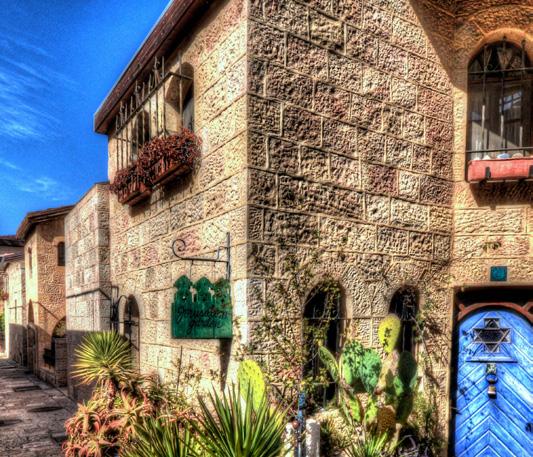








Nachamu: This Place
Rabbi Judah Mischel
Page 36
Why Did You Stay Alive?
Sivan Rahav-Meir
Page 70



Much excitement has surrounded Emunah Cohen and Neta Lax, the two fresh winners of the annual International Bible Quiz. Yesterday I interviewed them and heard their story.
It turns out that they studied long hours together and were confident they would be the leading competitors. "We planned on winning together," Emunah revealed. "We thought both of us would answer every question correctly so that we would both be champions, tied for first place.
But in the end Emunah won. "They made a big deal about our big hug after I lost," Neta said. "But it was the easiest thing to share in her happiness. Besides, we were just relieved that the competition was finally over."
In the course of the entire contest, Emunah made only one error. "I knew the answer to the question: 'When did King David cry for
BY SIVAN RAHAV-MEIR
the first time?' Yet I afterwards that HaShem the answer in order not know everything, not perfect."
"The more you learn," it gets. When you learn you simply see how to your life. I truly accompanied me wherever my heart feel good."
In closing, Neta declared: will continue to study were parts of the Tanach material covered by ant for us to learn them And Emunah had "Study the Bible for Not for school, not for for how much fun it
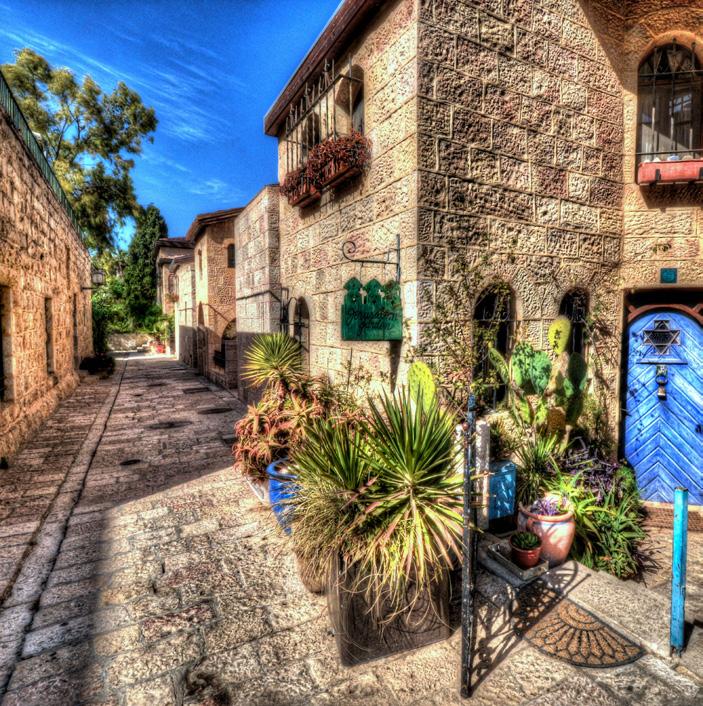

is
Rabbi
Aliya-by-Aliya Sedra
Rabbi Reuven Tradburks
“Disconsolation and Discontent”
Rabbi Dr. Tzvi Hersh Weinreb
Rabbi
Bishul Akum
Simchat
Rabbi
Teshuva Awakens in Many Forms
Rabbi Moshe Taragin

A Hug with Heart
Rebbetzin Dr. Adina Shmidman
Raising Children Who Yearn for the Beit HaMikdash
Rebbetzin Zemira Ozarowski
The Soul of the Shema
Rabbi Aaron Goldscheider
Giving Ma’asrot to the Intended Recipients
Rabbi Daniel Mann
Infusing Ourselves with Tefillah
Shoshana Judelman
Mishlei and Marriage
Mrs. Leah Feinberg
The Most Important Rule to Remember When Making a Rule Michal Silverstein MS
Did You Stay Alive?
Balev Mismatched Emotional Pace Aleeza Ben Shalom
The Y-Files Comic Netanel
Torah 4 Teens by Teens Naftali & Caroline // Avigayil Levine
IMAGE Photographed by Howard Gordon
My wife and I made Aliyah to Ramat Beit Shemesh in September 2023 but have been regular visitors to Israel for many years. Jerusalem has so many ‘faces’ from the ancient to the modern, boisterous and calm. This photograph was taken in the tranquil neighbourhood of Yemin Moshe in sight of the walls of the old city of Jerusalem. Old residences have been tastefully refurbished and the narrow streets are often adorned with blossoms. It’s always a delight to walk through.
Yerushalayim/Maale Adumim
Havdala Early Candles Havdala Early Candles 8:00
Ranges 11 days Wednesday - Shabbat
August 6 - 16 / 12 - 22 Av
Ranges 11 days Wed–Shabbat
Oct x–x / x–x Cheshvan
Earliest Tallit and Tefillin 5:03-5:11 Sunrise 5:58-6:04
Aza Area (Netivot, Sderot et al) 8:01 6:00
Earliest Tallit and Tefillin x:xx–x:xx Sunrise
Beit Shemesh/RBS
Alon Shvut
Raanana/Tel Mond/Herzliya/K.Saba
Be’er Sheva
/ Zichron
/ Givat Shmuel
8:10 6:07 7:11
Binyamin 8:01 6:00 6:57 8:09 6:05 7:04 Tzfat / Bikat HaYarden 8:00 5:59 7:02 8:08 6:05 7:09 Golan 8:03 6:01 7:04 8:11 6:07 7:11 Nahariya/Maalot 8:02 6:00 7:03 8:10 6:06 7:10 Afula
Rabbeinu Tam (Jerusalem): Va’etchanan 8:45 PM • Eikev 8:38 PM
8:02
Sof Zman Kriat Shema x:xx–x:xx
Magen Avraham x:xx–x:xx
Sof Zman Tefila x:xx-x:xx
Sof Zman Kriat Shema 9:21-9:24 Magen Avraham 8:41-8:45 Sof Zman Tefila 10:29-10:30 (According to the Gra and Baal HaTanya)
(According to the Gra and Baal HaTanya)
Chatzot (Halachic Noon) x:xx–x:xx
Chatzot (Halachic Noon) 12:44-12:43
Mincha Gedola (Earliest Mincha) 1:18-1:16 Plag Mincha 6:06-5:58
Sunset (Including Elevation) 7:35-7:25
Mincha Gedola (Earliest Mincha) x:xx–x:xx Plag Mincha x:xx–x:xx Sunset (Including Elevation) x:xx–x:xx
Seymour J. Abrams • Orthodox Union Jerusalem World Center • Avrom Silver Jerusalem College for Adults • Wolinetz Family Shul • Makom BaLev • Birthright • Yachad • NCSY in Israel • JLIC in Israel • Camp Dror • Pearl & Harold M. Jacobs ZULA Outreach Center • The Jack Gindi Oraita Program • OU Israel Kashrut
STUART HERSHKOWITZ, PRESIDENT OU ISRAEL Zvi Sand / Yitzchak Fund: Former Presidents, OU Israel | Rabbi Emanuel Quint z”l, Senior Vice President | Prof. Meni Koslowsky, Vice President
VAAD MEMBERS:
Michael Elman | Jonathan Eltes | Yonatan Frankel | Yitzchak Fund | Daniella Hellerstein | Stuart Hershkowitz | Jeremy Lustman | Yigal Marcus | Meir Raskas | Atara Reichel | Zvi Sand | Norman Schmutter | Mark Schneider | Esther Williams
RABBI AVI BERMAN, EXECUTIVE DIRECTOR, OU ISRAEL
All Times According to MyZmanim (20 mins before Sunset in most Cities; 40 mins in Yerushalyim and Petach Tikva; 30 mins in Tzfat and Haifa)
All Times According to MyZmanim (20 mins before Sunset in most Cities; 40 mins in Yerushalyim and Petach Tikva; 30 mins in Tzfat and Haifa)
Daf Yomi: Avodah Zarah 52
OU Kashrut
MITCHEL R. AEDER, PRESIDENT OF THE ORTHODOX UNION Yehuda Neuberger, Chairman of the Board, Orthodox Union | Dr. Josh Penn, OU Kashrus Commission
RABBI MOSHE HAUER, EXECUTIVE VICE PRESIDENT | RABBI JOSHUA M. JOSEPH, ED.D. EXECUTIVE VICE PRESIDENT & CHIEF OPERATING OFFICER Rabbi Dr. Tzvi Hersh Weinreb, Exec. V.P. Emeritus OU KOSHER: Rabbi Menachem Genack, CEO/Rabbinic Administrator OU Kosher | Rabbi Moshe Elefant, COO/Executive Rabbinic Coordinator ISRAEL: Rabbi Yissachar Dov Krakowski, Rabbinic Administrator | Rabbi Ezra Friedman, The Gustave and Carol Jacobs Center for Kashrut Education/ Deputy Rabbinic Administrator Headquarters: 40 Rector St. 4th floor, New York, NY 10006 212-563-4000 website: www.ou.org
Editor: Rabbi Aaron Goldscheider | aarong@ouisrael.org
Advertising: Ita Rochel 02-5609125 | ttads@ouisrael.org
Editor Emeritus: Phil Chernofsky Website: www.torahtidbits.com Not getting enough TTs? Too many? None at all? Contact our DISTRIBUTION 02-560-9100 • info@ouisrael.org
David Katz, CFO, OU Israel | Natan Kandler, COO, OU Israel | Chaim Pelzner, Director of Programs, OU Israel | Rabbi Sam Shor, Director, Torah Initiatives, OU Israel | Rabbi Sholom Gold zt"l, Dean, Avrom Silver Jerusalem College for Adults 7 Hartum Street, Jerusalem, 9777507 phone: (02) 560 9100 | fax: (02) 561-7432 email: office@ouisrael.org website: www.ouisrael.org
Founders and initial benefactors of the OU Israel Center: George and Ilse Falk a"h
Torah Tidbits and many of the projects of OU Israel are assisted by grants from THE JERUSALEM MUNICIPALITY

OU Israel, Torah Tidbits does not endorse the political or halachic positions of its editor, columnists or advertisers, nor guarantee the quality of advertised services or products. Nor do we endorse the kashrut of hotels, restaurants, caterers or food products that are advertised in TT (except, of course, those under OU-Israel hashgacha). Any "promises" made in ads are the sole responsibility of the advertisers and not that of OU Israel, the OU Israel Center , Torah Tidbits.

RABBI AVI BERMAN EXECUTIVE DIRECTOR, OU ISRAEL ABERMAN@OUISRAEL.ORG
Rabbi Avi Berman Executive Director, OU Israel
Life is filled with habits and routines. Most of the things we do today, we’re likely to do tomorrow. Naturally, over time, what was once exciting and new to us becomes part of our lives and much less interesting to us than when we first started.
For example, our son Mordechai Tzemach put on his tefillin for the first time a few weeks ago. I gave him a beracha that the excitement that he had on the first day of putting on tefillin should continue every single day in his life when he puts on tefillin. Nevertheless, it’s a reality of life. There are certain moments that stick out as unique for the first time we do them. The first time you drove a car. The first time you recited Eishet Chayil with your spouse on a Friday night. The first time you learned that amazing Torah idea that you cherish. As time goes by, those feelings typically fade.
Yet, there’s another element that I’ve
OU Israel mourns the passing of Marvin Sussman z”l
Beloved husband of Mrs. Aviva Sussman
Children in Israel: Avi & Rina from Raanana and JJ & Aliza from Modiin
As well as his children in the U.S.
The OU Israel Family
started to realize needs to be added to this understanding. There are some things that I’m finding that even though I do them every year, they actually get better every single year, more exciting, and more inspiring.
Perhaps getting older does that to a person, and I’m appreciating life more than a younger individual would. But I think it’s more than that. Perhaps it's that Klal Yisrael is changing and growing, moving closer and closer to the geulah shelema, and so there is newness in communal events even if I’ve experienced them before. Maybe it’s the fact that more and more Jews are living in Israel every single day, that more Jewish babies are being born in the Land of Israel, that there’s more Torah being learned in Eretz Yisrael, that there’s more and more soldiers willing to give their lives for the Jewish people, that more of the hostages are coming home (even though it pains us that 50 of our brothers and sisters are still being held in captivity). Since certain things are changing in Klal Yisrael, perhaps that is what is changing my emotional state and what I’m experiencing.
One of the things that keeps improving for me is going every year to the OU NCSY Kollel kumzitz at the Kotel as Tisha B’Av ebbs away. The songs that we’re singing, these shirei neshama, have such a deeper meaning and reach, so much higher than they did in the past. Even more inspiring and exciting is seeing the younger
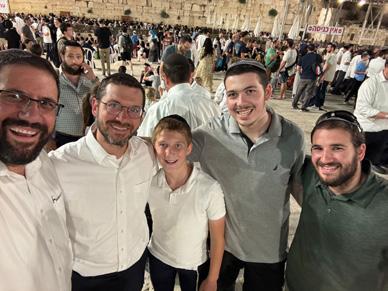
generation that comes to sing at the Kotel. These are teenagers who are walking in from all over, young adults who we might expect to say, “It’s a fast, I just want to lie down,” and yet they are coming and saying, “No. I want kedusha. I want to be at the Kotel and truly mourn our destruction and exile. I want to yearn for a Beit HaMikdash. I want to be one of the tens of thousands of Jews gathering at the Kotel, waiting to see the Beit HaMikdash be built.” It’s so clear they want to sing from their neshama.
Joining these teens are many olim, some very recent olim, many of whom came over to introduce themselves to me. It is always so impressive to see the mayor of Yerushalayim, Moshe Lion, come and join together with all of us. A reader of the Torah Tidbits by the name of Joey Joseph came over to me just to thank me. He said, “The way you wrote in Torah Tidbits about the kumzitz at the Kotel together with NCSY, I said, I have to experience it. And wow! Thank you for encouraging me to come.”
There are no words that can properly explain how incredibly uplifting this experience is. To see OU board members, including Yonatan Frankel and his son who made Aliyah to Ramat Beit Shemesh a few years ago, and OU Israel President Stuart Hershkowitz, sitting right next to the mayor of Yerushalayim, singing together to the Ribono Shel Olam, songs like Acheinu, begging HaKadosh Baruch Hu to please get our brothers and sisters out of Gaza, to release these hostages, to give Klal Yisrael
the power in Shema Koleinu and for the heavenly gates to open to our prayers, it’s simply unbelievable. To sing together and ask that we have the siyata d’shmaya and the strength necessary to defeat our enemies and to make the Land of Israel a place that can continue being a light unto the nations, it’s all so incredibly uplifting. It was very special to me that my sons Tzvi Yehuda (who is joining the army this Tuesday, and I’m sure I’ll write about that) and Yechezkel joined this year, as they do every year.
Add to the beautiful singing our very location, where we are. For so many Jews to gather at the place where the world was created, from the Even Hashetiya, with such a high level of spirituality literally meters away from us on Har Habayit, which gives spiritual strength to the entire world, you can’t help but say to yourself, “I can't believe how lucky I am to be able to stand here and be a part of this remarkable moment.”
The people I saw and spoke to gave me such pride in what we’re doing at the OU. Some of the NCSY Chai girls who attended
my Friday night shiur at the Shabbaton in Chispin just a few weeks ago came over to me, and I was amazed that they remembered what I spoke about and were able to continue discussing it with me there at the Kotel. Fathers and mothers of Camp Dror campers came over to me and told me how much their child appreciated camp.
It was so clear to me the impact that the OU is having in so many different ways, in so many different places, for so many different individuals. This is our purpose; it’s ultimately what the OU was created for. It was created in order to make sure that we are working day in and day out for the future of the Jewish people, both in North America as well as in Israel.
Baruch Hashem, the OU has been active in the Land of Israel for almost 50 years, and not a day goes by without us continuing to have such a deep impact and influence for so many. Yet, we have to acknowledge that this important work could not happen without you, your feedback, your support.
In loving memory of our dear Mother, Grandmother & Great Grandmother
May the Torah learned from this issue be in her merit
Cooki & Howie Maisel, Efrat Lenny & Penny Beer, Cleveland Ester Sara Carroll, Norfolk
To have over 56,000 people that viewed the Tisha B’Av video that we put out on YouTube, with the incredible work of Nina Broder, our director of social media, together with Rabbi Shlomo Katz, that is so inspiring to see. This is a video that was geared to making sure Klal Yisrael can feel closer and closer to the Beit HaMikdash on Tisha B’Av, and so many people were that much closer because of it. The feedback we have received has been completely positive and we thank you for it.
Thank you all for the strength that you give us, your encouragement, your financial support, and may we b’ezrat Hashem be able to continue to inspire Klal Yisrael for many more years.
I want to take this opportunity to wish all of us an enjoyable summer, a summer that allows all of us to spend time with our loved ones. After all, Elul is just around the corner, so let’s make sure to take advantage of the time, and we should all be happy, healthy, and safe.
Wishing you all an uplifting and inspiring Shabbat,

Rabbi Avi Berman
Executive Director, OU Israel



kerenmalki.org 02-567-0602 Keren

marci@bezeqint.net

















OU EXECUTIVE VICE PRESIDENT
Even if you can’t have it, you should still want it.
That may sound like the opposite of the tenth commandment, lo tachmod, that warns against desiring or coveting that which belongs to others. Lo tachmod, however, applies to things that are not meant for us. That which ought to be ours we must covet and desire and never stop yearning for. In fact, we use the descriptive of ‘desire’


positively regarding Eretz Yisrael, referring to it as Eretz Chemdah.
This can help us understand something very puzzling.
In the opening of our Parsha, Moshe pleads with Hashem to be allowed to cross over the Jordan and see Eretz Yisrael. While his plea to enter the land is rejected, Hashem instructs him to climb to a vantage point from which he will be able to see the land from a distance. What would be accomplished by seeing the land, especially when we consider the Talmud’s understanding (Sotah 14a) of what Moshe really wanted?
“Rabbi Simlai taught: For what reason did Moshe our teacher greatly desire to enter Eretz Yisrael? Did he need to eat its produce or satisfy himself from its goodness? Rather, this is what Moshe said: Many mitzvot were commanded to the Jewish people, and some of them can be fulfilled only in Eretz Yisrael, so I will enter the land in order that they can all be fulfilled by me.”
Which mitzvot would Moshe fulfill by seeing the land from a distance? Here we may again invert the usually negative pathway of desire. When the Torah (Bamidbar 15:39) warns us against straying after our heart and our eyes, our Sages (see Rashi there) explain the sequence of sin: “The eye sees, the heart desires, and the body acts.” In much the same way, Moshe was told to climb the mountain so that his eyes’ seeing the land would grow his heart’s desire for
its mitzvot, and while his body would not be allowed to follow through and act upon it, the desire itself matters. This understanding is implicit in the continuation of that Talmudic passage and its reading of Hashem’s actual response to Moshe:
“The Holy One, Blessed be He, said to him: Do you seek to enter the land to perform these mitzvot for any reason other than to benefit? I will grant you credit as if you had performed them.”
Gazing at the land and the resultant desire for it and its mitzvot would itself generate the benefit of the mitzvot, as the Talmud teaches elsewhere (Kiddushin 40a):

Did you know South African Jewry designed, financed, built and managed Ashkelon from 1949 to 1959?
We have the largest selection of exclusive sea view properties in this beautiful city… and at the most attractive prices!











and our next step will be to plant a fruit tree. I never thought of myself as being the agricultural type, but the feeling of settling and planting a portion of Eretz Yisrael, has been truly euphoric. Iy”H, when we plant our tree, and eat the fruits that will grow one day, I think we will be able to truly appreciate that unique Kedusha found in the fruit of Eretz Yisrael!
To conclude, when you buy your Tu B'shvat fruit this year, don’t search for those dried apricots and banana chips imported from Turkey. Rather, head over to the fresh produce and buy yourself some nice juicy Kedusha-filled Jaffa oranges and thank Hashem for bringing you to this land in order , imbibing that Kedusha in every bite that you take!!





Aliya-by-Aliya Sedra Summary
RABBI REUVEN TRADBURKS
RCA Israel Region ALIYA-BY-ALIYA
Rabbi Reuven Tradburks
RCA ISRAEL REGION
In memory of Evelyn Rivers a”h
Mother of Reuven Tradburks
1ST ALIYA (3:23-4:4)
I beseeched G-d to allow me to enter the Land. He refused: ascend the mountain, gaze at the Land that you will not enter. Charge Yehoshua, for he will lead the people. Now, Yisrael, Shema, listen to the commandments so you will remain in the Land. You saw what occurred with Baal Peor: those who followed Baal Peor were punished while those who did not, survived.
The tone and language of the Torah changes dramatically in this parsha. We have had narrative. And we had commandments. But now we have suasion. Moshe says: listen. He will say listen a lot. He is arguing. Or cajoling. Or better, pleading. Or coaxing. He is making the case for being loyal to G-d and
A true symbol of Torah values and loved by all
Survived by her loving family, husband, children, grandchildren and great-grandchildren
She passed away on Friday, August 1st - 7 Av
to the Torah.
Moshe’s long speech that takes up almost the entire book of Devarim began by addressing the people’s present frame of mind. They are standing on the banks of the Jordan, ready to enter the Land. Without Moshe. They are nervous, uncertain, afraid, unsure of their ability to conquer the Land, especially without Moshe as their leader. He addressed those concerns, their immediate frame of mind in last week’s parsha.
In our parsha, he begins to address not the present but the future. He desperately wants the people to stay loyal to G-d. And he knows that is going to be challenging once they enter the Land.
2ND ALIYA (4:5-40)
Keep the mitzvot, for they are wise. The nations will look at the mitzvot and say: what a wise people. And who has a G-d as close as ours is to us? Or who has noble laws as our Torah? Remember the day at Sinai, the mountain on fire and the darkness of the cloud. The Voice emanated but there was no form. Make no images. I taught you the mitzvot; keep them, for they are the covenant G-d commanded from you. Your children will make images and be exiled, flung to the ends of the earth, serving idols there. They will return to G-d, seeking Him with all their heart. He will not forget His covenant. Has any other people heard G-d’s voice amidst fire? Or another one Who took His people with wonders from amidst another? Know and take to heart that there
is none other than G-d.
Moshe begins with two themes; what we have and who we have. What we have is our Torah. It is unique, wise, noble. Special. And ours. We tend to think what others have is better than what we have. No, no. What we have is a treasure.
And we also have a close friendship with G-d. He spoke to us. That too is special. Unique.
Remember both these things and stay loyal to them. Your success in the Land depends on them.
And then, before they even take one step into the Land, Moshe tells them they will be exiled. Because the Land is the place of intimacy with G-d. If you abandon that, He too abandons you and flings you to the corners of the earth.
Come back to Him, He will bring you back to here.
3RD ALIYA (4:41-49)
Moshe separated 3 cities of refuge for those who kill accidentally on the east side of the Jordan. Moshe taught these laws on the east side of the Jordan in the lands already conquered. These conquered lands extend from the Dead Sea all the way to Mt. Hermon.
Moshe’s choosing 3 cities of refuge on the east side of the Jordan, is his confirmation of the right of Bnei Gad, Bnei Reuven and half of Menashe to dwell there.
And his confirmation that our life will never be paradise. We aren’t entering a dream. We are entering a stage in our history that is special, but people are people, terrible things, like manslaughter will happen. You are special, the Land is special, while at the same time we are human beings. That is the
balance we seek; living great lives with full awareness of our human foibles.
4TH ALIYA (5:1-18)
Mt. Sinai. Moshe called the people: Shema Yisrael to the commandments, for our G-d made a covenant at Sinai. He made it with you, face to face amidst fire. I communicated it because you were afraid. And He said: I am G-d who took you out of Egypt. Do not make images. Or take My name in vain. Guard Shabbat as a day of rest to remember that you were slaves in Egypt. Honor your father and mother. Do not murder, commit adultery, steal, bear false witness, covet.
Moshe now begins his motivational speech to the people, his coaxing, his pleading, his cajoling. And he begins with G-d’s reach for man. He made a covenant with us. And He spoke with us.
The moment of Sinai is a dramatic moment of love. His love for us. He wanted to descend on the mountain to speak with mankind.
The meaning of Mt. Sinai is not the content of the 10 commandments. It is the drama of G-d bending down, reaching for man, initiating an intimate and direct contact with us. Descending on the mountain to speak directly with us.
And while the people present were fearful, we, upon reflecting on that powerful and intimate moment, we responded to His love for us, with our love for Him.
5TH ALIYA (5:19-6:3)
When you heard these words amidst the fire and the cloud you were afraid. You approached and said: now we know man can hear G-d’s voice but we are afraid we will die. Moshe, you hear from Him, not us. G-d agreed and said to me: you
stand with Me and I will tell you all the commandments to keep in the Land.
The word Shema appears 8 times in the first 7 verses of this aliya. The people heard the Voice at Sinai but were afraid. So, Moshe, you hear it for us. And G-d heard their suggestion and said it was good. Fine, Moshe will hear G-d’s voice.
But who hears is not the issue. The issue is who hears. I mean, who hears the voice with his ear; that can be Moshe. That’s fine. But who hears, I mean, hears, gets it, understands it, accepts it; that, is you.
That is Moshe’s plea. Let this drama sink in. Absorb it. For this is dramatic. It is your unique relationship with G-d. Do not treat it casually. Hear it loud and clear.
The Shema. Shema Yisrael, G-d is one. You shall love G-d, and have that on your heart constantly; teaching of it to your children, speaking of it, at all times and in all places. Be bound with love of G-d; let it guide you and your home. When you come into the Land, you will find things that you did not build: large and good cities, homes full of wonderful things, cisterns, vineyards, olive groves. But be careful to not forget G-d. Fear Him, serve Him. Do what is moral and good in His eyes and He will do good for you. When your children ask you about all these commandments, tell them: we were slaves in Egypt, G-d took us out to give us this Land. These commandments are to cultivate awe of Him and bring us merit, to preserve us in this Land.
While we love the first line of the Shema, it is the second that is the emphasis of the paragraph. Love of G-d. All your heart, all your soul, all your might. We are used to saying
this line so we become numb to its power. Moshe is speaking to the people: pour yourself into this. Let it go. Invest all you got into it. No inhibitions. Love of G-d is to animate all of your life: bubbling over to your children, percolating in you in your travels, your actions, your thoughts, your home. Wow. Little wonder that this paragraph is the heart of our daily tefila. We need to be G-d obsessed. Moshe is plain as day here: love G-d with all your heart, soul and might. All in.
When you come into the Land, conquer the seven nations. Do not make any covenant with them. Do not marry them, for that will lead to idol worship. You are G-d’s holy people. Not because you are numerous but because He loved you and made a covenant with you. Know: He keeps His covenant. You too keep the mitzvot.
The love of G-d is exclusive. Idol worship violates that love. Be wary of the path to infidelity: people. Covenants with the idol worshippers of the Land will soften the way to their gods. And more dramatically, marrying the people of the Land accelerates the path to their gods.
In both it is the allure of belonging. Marry a woman, join her faith group, enjoy the fellowship, camaraderie; the sense of belonging that a faith community brings. There are a lot of wonderful and satisfying elements to any faith community. But. That is a complete violation of your unique relationship with G-d (in addition to the folly of these gods). It is not the mind that attracts you; it is the community that comes with the wife. Marrying the non-Jew can easily begin the process of idol worship. Hence, shun intermarriage.
This week’s haftorah is the first of a series of seven “haftarot of Consolation.” These seven haftarot start on the Shabbat following Tisha B’Av and continue until Rosh Hashanah.
This section of Yeshayahu begins with G-d’s conveying to the prophet: “Console, O console My people . . . Announce to Jerusalem that her period of exile has been fulfilled and that her sins have been forgiven.”
Yeshayahu’s prophecy describes some of the remarkable events that will unfold with the onset of the messianic era. These include: the return of the exiles to Yerushalayim, the revelation of Hashem’s glory, and the rewards and retribution that will then be meted out to the nations of the world.
The navi then goes on to comfort the people, describing G-d’s power and might, and reassuring them of His care for His people.
45th of 54 sedras; 2nd of 11 in D’varim. Written on 249 lines in a Torah, rank: 7. 21 parshiyot; 5 open, 16 closed, 7th (tied with Ki Tavo).
122 pEsukim - rank: 17 (2nd in Devarim) same as Vayak’hel & Ki Tavo - but larger. 1878 words; rank: 10th (2nd in Devarim). 7343 letters; rank: 10th (2nd in Devarim).
Va’etchanan’s pesukim are longer than average, hence the jump in rank from 17th for pesukim to 10th for words.
12 of 613 mitzvot: 8 positive, 4 prohibitions and many more that are counted elsewhere - this is so for several sedras, but it really shows for Va’etchanan (e.g. Aseret HaDibrot in Yitro has 14 mitzvot, repeated here but not counted here).
BY RABBI CHANOCH YERES RAV, BEIT KNESSET BEIT YISRAEL, YEMIN MOSHE
“Watch out, immensely, for yourselves for you saw no manner of form…Lest you deal corruptly and make for yourselves a graven image.” (4:15,16)
Why does the pasuk teach us by stressing watching ourselves immensely (meod)?
The Chofetz Chaim (1838-1933) points out that every person must take care of one’s health and well-being. A person should be wary of how he treats his body without extreme care. As a taxi driver minds the upkeep of his cab so it does not break down on the road, so too we must maintain our physical health and physique to continue our tasks in this world. The Chofetz Chaim rebuked a Rosh Yeshiva who restrained from eating meat to better provide for his students. He told him that amongst other priorities, it is vital that his students see a healthy Rosh Yeshiva.
The Meshech Chochma (R’ Meir Simcha Divinsk 1843-1926) placed emphasis on the context of the verse. One needs to make a great effort to avoid Idolatry. One reason given for Moshe being refused entry to Israel was due to his high spiritual level and capabilities. He brought forth great miracles and went without eating or drinking. The Torah was concerned that the new generation entering the Land of Israel, might not remember Moshe’s humble beginning, and misconstrue him as Divine. “And the people spoke against G-d and Moshe (Bamidbar 21:5) upon which the Midrash Rabbah (19:12) adds that “They equated the servant with the Master.” Due to the fear that the new generation would deify Moshe, his entrance into the Land was denied. - Shabbat Shalom

BY RABBI DR. TZVI HERSH WEINREB OU EXECUTIVE VICE PRESIDENT, EMERITUS
BY RABBI DR. TZVI HERSH WEINREB OU EXECUTIVE VICE PRESIDENT, EMERITUS
This week, after spending the past three weeks memorializing and mourning the past catastrophes which befell our people over the course of our long history, we all are offered consolation at the hands of Prophet Isaiah.
In the haftarah, which serves as the climax after the reading of this week’s Torah portion, VaEtchanan (Deuteronomy 3:23-7:11), we are asked to be edified by the eloquent words which only Isaiah was capable of articulating: Comfort, comfort, My people—these are your God’s words—speak to Jerusalem’s heart and call out to her that her term is served, her guilt appeased, that she has received at the Lord’s hand twice over for all her sins. A voice calls out: “Clear the Lord’s way in the desert: smooth across the arid plain a road for our God.” Every valley will
be raised, each hill and mountain leveled; the twisted road will be made straight; the mountain ranges, open land, to let the Lord’s Glory be revealed… (Isaiah 40: 1-5)
These reassuring words are meant to console and comfort a people who have suffered severely and repeatedly over many centuries, nay millennia. One wonders, however, if it is realistic to attempt to allay the profound pain of victims of unspeakable terror with mere words, eloquent as they may be.
After all, when Jacob was first informed about his favorite son Joseph's supposed fate, he declared, “A wild animal must have eaten him! Josef has been torn limb from limb!” And then we read, “… he mourned for his son for many days. All his sons and daughters tried to comfort him, but he refused to be comforted and said, ‘I will go down to the netherworld mourning for my son.’” (Genesis 37:33-35)
To say the least, Jacob was disconsolate, inconsolable, dejected. Is it only fair to ask, “If our patriarch Jacob would not yield to the words of comfort extended to him by his own immediate family, how can we be expected to easily recover from the agonies of our heart-rending history?”
Or consider the example of Jacob’s cherished wife, Rachel. This time, I refer to the
words of the Prophet Jeremiah: “A sound is heard in Rama: wailing, bitter weeping. It is Rachel, weeping for her children. She refuses to be consoled for her children, for they are all gone.” (Jeremiah 31:14)
Note that both Jacob and Rachel refuse to accept comfort, to be consoled. They adamantly choose to remain disconsolate, inconsolable, dejected.
How are we, then, to blithely dismiss the emotions of recent weeks, laden as they were with sadness, fasting, and heartfelt lamentations? Can we deftly transmute Shabbat Chazon and the elegies of Tisha B’Av into Shabbat Nachamu and no less than seven weeks of joyous inspiration?
Or, to focus on our contemporary circumstances, surrounded as we are with widows and orphans of soldiers killed in battle, can we not empathize with those who “refuse still to be consoled?” Can traumatized individuals conceivably be soothed by comforting words, however inspiring they may be?
To address this question, and hopefully to provide some food for thought for those of my contemporaries who still feel perplexed and stymied by the horrors of the Holocaust, and more recently by all that has ensued since October 7, 2023, allow me to refer to two rabbinic sources as well as draw upon my own training in the psychological treatment of trauma.
The first source is from Rabbi Shimon Schwab’s Maayan Bais HaSho’evah . He reflects upon this verse: “As a man is consoled by his mother, just so shall I comfort you…” (Isaiah 66:13) He asks, why a “mother” rather than a “father”, and why a “man” rather than a “child”? He answers that it is the mother who went through the
difficulties of pregnancy and the pangs of childbirth, and all of the consequent difficulties of child rearing, especially during adolescence. During that entire time, she did not experience the full joy attributed to having a child. It came with all sorts of tribulations and disappointments. But now that her son was a mature man, she could conclude that it was all worth it. She could assure her grown child, who was going through his own tests and challenges, that he will reach the point of being able to be consoled and indeed to accept his current difficulties from a fresh perspective, just as she has now that she raised him.
Another approach is offered in an essay by Rabbi Yechiel Yaakov Weinberg, author of the Seridei Aish. He reflects upon his own Holocaust experiences in the Warsaw Ghetto before he escaped from it. He writes: “That is the manner of the experience of suffering. It has a way of creating a new soul-energy in the person, “softening his sins,” as the Talmud puts it. A new and revived soul enters the fray. New powers emerge from the subconscious and transform one’s previous existence.”
Rabbi Weinberg’s approach is very close to that of one of my mentors in the field of recovery from trauma. I refer to Dr. Judith Lewis Herman, author of the book Trauma and Recovery. In the introduction to her book, she writes:
The ordinary response to atrocities is to banish them from consciousness… Atrocities, however, refuse to be buried. The conflict between the will to deny horrible events and the will to proclaim them aloud is the central dialectic of the psychological trauma… She emphatically asserts that the process
of healing from trauma takes quite a long time, often even many years. But it reaches a point when the person achieves what she calls “reconnection”.
Thus, Dr. Herman continues, “the simple statement—‘I know I have myself’—could stand as the emblem of my own recovery… Her task now is to become the person she wants to be!”
In my own thinking, I’ve adopted a slightly different terminology. All who suffer have, as the author of Tehillim puts it, a “broken heart”. But with time, inner work, a supportive environment, and well-meaning consolation, there comes a “breakthrough”. It is a sense of a mission and new life purpose which is freeing, sundering the bonds of victimhood and relieving the burdens of anger and anxiety.
It is a freedom that we call nechama and geula, comfort and redemption. Such is the mood of Shabbat Nachamu, and such should be the mood of the next seven weeks of consolation culminating in the wonderful New Year which lies ahead, a year of healing and recovery, of calm and true peace, of a “breakthrough” to new and lasting achievements as individuals and as a totally unified nation at last.


Under 74.5?

Don't wait until it's too late. Your age is your advantage – use it today.

been memorialized in a popular song, "An
Max Weinberger z”l
Patience is necessary for those who fol low Isaac's way. But a wise woman taught us that patience is but another name for hope. That woman was Jane Austen, who put these words into the mouth of one of the characters in her great novel, Sensibility: "Know your own happiness. You want nothing but patience—or give it a more fascinating name: call it hope."
Greatly missed by their children, grandchildren and great grandchildren
Rav Aryeh and Dvora Weinberger
Bernie and Leah Weinberger Menachem and Hannah Katten In observance of the Shloshim of

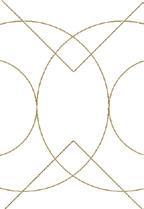


















Israel Magen Fund has been on the front lines of support since Oct. 7 2023. We launched the Adopt a Soldier campaign to equip new recruits with high quality tactical kits.
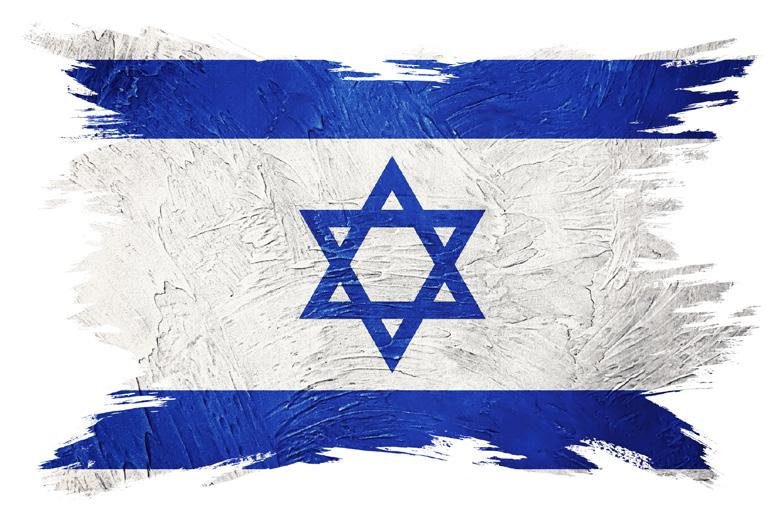
Following our successful distribution of 1000 kits to Yeshivot hesder boys since 2024, with your help we can reach our goal of 2000 soldier kits by December 2025.

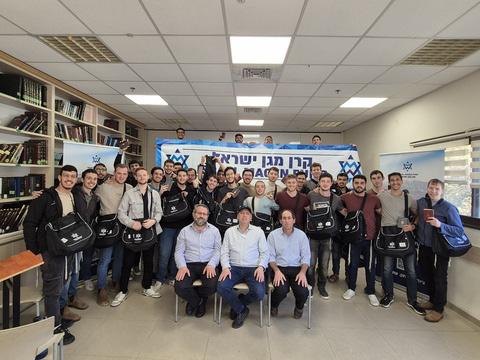



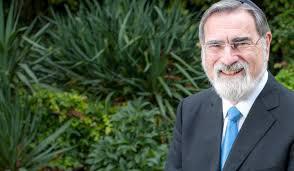
Covenant & Conversation
THOUGHTS ON THE WEEKLY PARSHA
Thoughts on the Weekly Parsha
RABBI LORD JONATHAN SACKS ZT"L
RABBI LORD JONATHAN SACKS ZT"L
FORMER CHIEF RABBI OF THE UNITED HEBREW CONGREGATIONS OF THE COMMONWEALTH
FORMER CHIEF RABBI OF THE UNITED HEBREW CONGREGATIONS OF THE COMMONWEALTH
May the learning of these Divrei Torah be
HaRav Ya'akov Zvi ben David Arieh zt"l
There is a statement made towards the end of Parshat Va'etchanan, and it is so inconspicuous that we can sometimes miss it, but it is a statement with such far reaching implications that it challenges the impression that has prevailed thus far in the Torah, giving an entirely new complexion to the biblical image of the people Israel.
The Lord did not set His affection on you and choose you because you were more numerous than other peoples, for you are the fewest of all peoples. (Deut. 7:7)
This is not what we have heard thus far. In Bereishit, God promises the patriarchs that their descendants will be like the stars of the heaven, the sand on the sea shore, the dust of the earth, uncountable. Abraham will be the father, not just of one nation but of many. At the beginning of Exodus we read of how the covenantal family, numbering a mere seventy when
they went down to Egypt, were “fertile and prolific, and their population increased. They became so numerous that the land was filled with them” (Ex. 1:7).
Three times in the book of Deuteronomy, Moses describes the Israelites as being “as many as the stars of the sky” (Deut. 1:10, Deut. 10:22, Deut. 28:62). King Solomon speaks of himself as set among “the people you have chosen, a great people, too numerous to count or number” (1 Kings 3:8). The prophet Hosea says that “the Israelites will be like the sand on the seashore, which cannot be measured or counted” (Hos. 2:1).
In all these texts - and others - it is the size, the numerical greatness, of the people that is emphasised. What then are we to make of Moses’ words that speak of its smallness? Targum Yonatan interprets it not to be about numbers at all but about self-image. He translates it not as “the fewest of peoples” but as “the most lowly and humble of peoples.” Rashi gives a similar reading, citing Abraham’s words “I am but dust and ashes,” and Moses and Aaron’s, “Who are we?”
Rashbam and Chizkuni give the more straightforward explanation that Moses is contrasting the Israelites with the seven
nations they would be fighting in the land of Canaan/Israel. God would lead the Israelites to victory despite the fact that they were outnumbered by the local inhabitants.
Rabbenu Bachya quotes Maimonides, who says that we would have expected God, King of the universe, to have chosen the most numerous nation in the world as His people, since “the glory of the king is in the multitude of people” (Prov. 14:28).
God did not do so. Thus Israel should know they are a people extraordinarily blessed that God chose them, despite their smallness, to be His am segulah, His special treasure.
Rabbenu Bachya finds himself forced to give a more complex reading to resolve the contradiction of Moses, in Deuteronomy, saying both that Israel is the smallest of peoples, and also “as many as the stars of the sky.” He turns it into a hypothetical subjunctive, meaning: God would still have chosen you, even if you had been the smallest of the peoples.
Sforno gives a simple and straightforward reading: God did not choose a nation for the sake of His honour. Had He done so He would undoubtedly have chosen a mighty and numerous people. His choice had nothing to do with honour and everything to do with love. He loved the patriarchs for their willingness to heed His voice; therefore He loves their children.
Yet there is something in this verse that resonates throughout much of Jewish history. Historically Jews were and are a small people: today less than a fifth of one per cent of the population of the world. There were two reasons for this. First is the heavy toll taken through the ages by exile


Jerusalem Real Estate is My Business Eta: 054-723-3863
Amazing stand alone homes in OLD KATAMON, TALBIYA, BAKA, GERMAN COLONY
Exclusive BAKA. Fantastic, charming apartment. 100 sqm with Shabbat elevator, sukka terrace, registered parking and storage. 113 sqm attic. High ceilings and very light!!!!
Price 5,987,000 NIS
New project SAN SIMON. 140 sqm on one floor, Shabbat elevator parking, storage.
Built as 3 bedrooms and 2.5 bathrooms. Perfect condition.
Price 7,500,000 NIS
ABU TOR RENTAL APARTMENT
150 sqm on 2 floors, historic apartment, 3 bedrooms, 2 full bathrooms, garden. Price 13,000 NIS/month
ARNONA 180 sqm
Penthouse on an exclusive street. Fabulous views. 40 sqm balcony. Registered parking. Very high standard finish. Price: 9,200,000 NIS






Stand alone home, newly built and ready to move in the GERMAN COLONY
Over 450 sqm built, private parking, large outdoor areas- internal elevator. Please call for more information
Eta Morris Realty, Ltd. etamorrisrealestate@gmail.com
Eta: 054-723-3863 etamorrisrealty.co.il
and persecution, directly by Jews killed in massacres and pogroms, indirectly by those who converted – in fifteenth century Spain and nineteenth century Europe – in order to avoid persecution (tragically, even conversion did not work; racial antisemitism persisted in both cases). The Jewish population is a mere fraction of what it might have been had there been no Hadrian, no crusades, and no antisemitism.
The second reason is that Jews did not seek to convert others. Had they done so they would have been closer in numbers to Christianity (2.2 billion) or Islam (1.3 billion). In fact, Malbim reads something like this into our verse. The previous verses have said that the Israelites are about to enter a land with seven nations, Hittites, Girgashites, Amorites, Canaanites, Perizzites, Hivites and Jebusites. Moses warns them against intermarriage with them, not for racial but for religious reasons: “they will turn your children away from following Me to serve other gods.” Malbim interprets our verse as Moses saying to the Israelites, Don’t justify outmarriage on the grounds that it will increase the number of Jews. God is not interested in numbers.
There was a moment when Jews might have sought to convert others (to be sure, there was one instance when they did. The Hasmonean priest-king John Hyrcanus I forcibly converted the Edomites, known as the Idumeneans. Herod was one of their number). The period in question was the Roman Empire in the first century. Jews numbered some 10 per cent of the empire, and there were many Romans who admired aspects of their faith and way of life. The pagan deities of the Hellenistic
world were losing their appeal and plausibility, and throughout the centres of the Mediterranean, individuals were adopting Jewish practices. Two aspects of Judaism stood in their way: the commandments and circumcision. In the end, Jews chose not to compromise their way of life for the sake of making converts. The Hellenistic people who sympathized with Judaism mostly adopted Pauline Christianity instead. Consistently throughout history, Jews have chosen to be true to themselves and to stay small rather than make concessions for the sake of increasing numbers.
Why have Divine Providence or human choice or both, eventuated in the sheer smallness of the Jewish people? Could it be, quite simply, that through the Jewish people God is telling humankind that you do not need to be numerous to be great. Nations are not judged by their size but by their contribution to the human heritage. Of this the most compelling proof is that a nation as small as the Jews could produce an ever-renewed flow of prophets, priests, poets, philosophers, sages, saints, halachists, aggadists, codifiers, commentators, rebbes and roshei yeshivot; that they could also yield some of the world’s greatest writers, artists, musicians, film-makers, academics, intellectuals, doctors, lawyers, businesspeople and technological innovators. Out of all proportion to their numbers Jews could and can be found working as lawyers fighting injustice, economists fighting poverty, doctors fighting disease, and teachers fighting ignorance.
You do not need numbers to enlarge the spiritual and moral horizons of humankind. You need other things altogether: a sense
of the worth and dignity of the individual, of the power of human possibility to transform the world, of the importance of giving everyone the best education they can have, of making each of us feel part of a collective responsibility to ameliorate the human condition, and a willingness to take high ideals and enact them in the real world, unswayed by disappointments and defeats.
Nowhere is this more in evidence today than among the people of Israel in the state of Israel: traduced in the media and pilloried by much of the world, yet still, year after year, producing human miracles in medicine, agriculture, technology, the arts, as if the word “impossible” did not exist in the Hebrew language. When, therefore, we feel fearful and depressed about Israel’s plight, it is worth returning to Moses’ words:
“The Lord did not set His affection on you and choose you because you were more numerous than other peoples, for you are the fewest of all peoples.”
Small? Yes. Still surrounded, as the Israelites were then, by “nations larger and stronger than you.” But that small people, defying the laws of history, outlived all the world’s great empires, and still has a message of hope for humanity. You don’t have to be large to be great. If you are open to a power greater than yourself, you will become greater than yourself. Israel today still carries that message to the world.
These weekly teachings from Rabbi Sacks zt”l are part of his ‘Covenant & Conversation’ series on the weekly Torah teaching. With thanks to the Schimmel Family for their generous sponsorship, dedicated in loving memory of Harry (Chaim) Schimmel. Visit www.RabbiSacks.org for more.
1 - Three rooms, with long-term tenant, virtually on the beach just 1.8m₪. Great investment
2 - Four rooms, magnificent views, luxury building overlooking the marina & sea. 3.85m₪
3 - Five rooms, NEW, sea views, Very special LOW price


• U.S. & Israeli Tax Returns and Planning
• U.S. & Israeli Tax Returns and Planning
• U.S. & Israeli Corporate Tax Returns and Planning
• U.S. & Israeli Bookkeeping & Accounting Services
• U.S. & Israeli Corporate Tax Returns and Planning
• U.S. & Israeli Retirement and Benefits Consulting
• U.S. & Israeli Bookkeeping & Accounting Services
• IRS and Israeli Tax Authority Audit Representation
• IRS Streamlined Filing Program
• Estate and Trust Tax Planning
• IRS Streamlined Filing Program
• Foreign Bank Reports (FBAR)
• Estate and Trust Tax Planning
• U.S. Child Credit
• Foreign Bank Reports (FBAR)
• Other Accounting Services
• U.S. Child Credit
Trusted US/Israeli tax services for over 30 years It’s never too late to file prior years’ taxreturns!
Trusted US/Israeli tax services for over 30 years It's never too late to file prior year's tax returns!
• U.S. & Israeli Retirement and Benefits Consulting
• IRS and Israeli Tax Authority Audit Representation
Trusted US/Israeli tax services for over 30 years It’s never too late to file prior years’ taxreturns!
• Other Accounting Services Please contact us: 02-999-2104 | 09-746-0623 |03-527-3254 | 052-274-9999
Please contact us: 02-999-2104 | 09-746-0623 |03-527-3254 | 052-274-9999
Email: alan@ardcpa.com www.ardcpa.com
Please contact us: 02-999-2104 | 09-746-0623 | 052-274-9999
Email: alan@ardcpa.com www.ardcpa.com
Email: alan@ardcpa.com www.ardcpa.com

BY RABBI NACHMAN (NEIL) WINKLER FACULTY, OU ISRAEL CENTER
As was true of last week’s haftarah, the familiar name of the Shabbat – Shabbat Nachamu - is also drawn from the opening word of the haftarah. There is, however, a difference, in that the very appellation of the Shabbat reflects more than a simple connection to the haftarah. Indeed, the name itself expresses what the Shabbat itself should be…. one of consolation and comfort. It is meant to be a Shabbat of “Nechama” – solace and succor – inspired by the words of our haftarah. But do we really find any comfort in Yishayahu’s message?
Upon studying the text of the haftarah, we find very little comfort in the opening verses. The first expression of “consolation” informs the suffering nation that their sin has been
Do you have a life insurance policy you:
• No longer want?
• No longer need?
• Can no longer afford the premium?
• Could you use extra money instead of keeping your policy?
I can guarantee that if you qualify with the underwriting process I can get you more money than if you cash it in with the company.
Please contact Moshe Russell at: Buymypolicy32@gmail.com
forgiven for she has received double [punishment} from Hashem for her sins! There is no mention of redemption, return to the land or a glorious future – only the obvious truth that they have suffered through a double punishment, that has now ended.
The Ibn Ezra quotes the pasuk in Megillat Eicha [4: 22] as being an echo of these opening verses, as it states “Tam avoneich Bat Tziyon-lo yosif l’hagloteich”, “Your sin is atoned (ceased)…. [Hashem] will exile you no more”. These words, like those in our haftarah, express some relief – but not true consolation!
And so we ask: Where is the comfort? Where is the encouragement? Where are any words that would bolster the hope of a grieving nation?
Simply put: Where is the “nechama” of “Nachamu”?
The answer to this question is found in the p’sukim that follow the rather “unconvincing” introduction of the haftarah. The rest of Yishayahu’s nevu’ah, begins by describing Hashem’s strength that overpowers all natural forces. even emphasizing the incomparable acts performed by Hashem. And yet, these first verses, too, do not really fulfill Israel’s need for solace and succor.
But a careful read of these p’sukim will better reveal a powerful message left for both that generation and many future ones as well. Consider: Of what purpose is a prophecy that one could not guarantee? Of what good
is a promise that one cannot keep? For this very reason this fortieth perek, the chapter that marks the beginning of Yishayahu’s prophecies of comfort, opens with words that appear to lack any real message of consolation. It was first essential for the grief-stricken generation to hear more than promises or pledges. Those who have been devastated by many years of torment, pain and loss will, understandably, find assuring words alone as being empty and meaningless. This is the reason why HaKadosh Baruch Hu told His navi “NACHAMU” – “Comfort My people” –by first assuring them that it is I, the Eternal One, He Who guarantees His promises and His prophecies…. and, therefore, their very future.
And how interesting it is that, in the middle of describing the great abilities of the all-powerful G-d, Yishayahu adds a verse that seems out of place: “K’ro’eh edro yir’eh, bizro’o y’kabetz t’la’im u’v’cheiko yisa…” “As a shepherd tends his flock - gathering lambs in his arms and carrying them in his bosom…”. The beautiful depiction of Hashem as a caring shepherd Who lovingly leads and protects His flock is a compelling lesson leaving Israel with the knowledge that G-d is not only One Who is capable of fulfilling His prophecies, but that He would do so because He is the Faithful Shepherd of His nation.
And what better message could be given to the nation than this introduction to Yishayahu’s magnificent prophecies of their future, their redemption….and, therefore, their ultimate comfort!!
Rabbi Winkler’s popular Jewish History lectures can be viewed by visiting the OU Israel Video archive: https://www.ouisrael.org/video-l ibrary


LUXURY PROJECTS & APARTMENTS IN NETANYA NORTH, PARK HAYAM, IR YAMIM Ideal for Anglos, walk to sea, beach, sea views with many options to suite all lifestyle & choices
Limited pre-sale options
ü Prime location
ü Spacious 3, 4, 5, 6 room options
ü High end premium finishes and layouts
ü Ideal for families, investment or Aliyah ü Some options 20% secures deal, others TBA ü Options available now or within 1 to 3 years
ü Schedule your free no obligation consultation today and make your Dreams come True!
CONTACT US TODAY

Tel/WhatsApp: +972 50 446 9515 Office: +972 02 568 6578
Email: info@israel-properties.com www.israel-properties.com






























Jodi Sugar For Sale: Ben Maimon, 4 rooms, 113m, 2 bathrooms, porch, 1st floor, elevator, 6.2 million NIS

maimhaim.org/womensretreat 053 450 6927 | info@maimhaim.org

Prime Location in the German Colony HaTzfira Street
A boutique Tama 38 project set to be completed within 36 months, offering an exceptional living experience in one of Jerusalem’s most desirable neighborhoods. Highlights Include: � Spacious 3 and 4-room apartments, all with Sukkah balconies and storage � A luxurious penthouse with nice space and terraces. � Private parking and high finishes. � Ideally located close to cafes, shops, and cultural attractions. For more details, please contact Trust Real Estate Smadar - 050-3114040

Smadar 050-3114040 // 02-642-4329 smadi_bida@walla.co.il



Rabbi Shalom
ROSNER
RAV KEHILLA, NOFEI HASHEMESH MAGGID SHIUR, DAF YOMI, OU.ORG ROSH BAIS
In Parshat Va’etchanan we are instructed not to add or detract from the commandments. What is wrong with adding? Why not take two etrogim or add a fifth parsha to tefillin. Why is this viewed in a derogatory manner? Why can’t kohanim add another blessing when they perform birchat Kohanim? Isn’t there a cliché of “the more the merrier”?
The Torah Temima suggests that once one is able to add mitzvot, it will eventually lead to subtracting mitzvot as well. The precise number of mitzvot and the manner in which they are to be performed will not be understood as an exact measure and will

be adjusted in both directions.
Rabbi Baruch Halevi Epstein, who was the author of the Torah Temima, expands upon this idea in his sefer Tosefet Bracha. He claims that the wording of the pasuk itself indicates that one should not add as it will result in one also reducing. The term ונממ
אלו – is not to be understood as “don’t” detract but rather “so that” (ןעמל) it does not lead one to detract.
There are several examples where the simple understanding of the term אלו (don’t) means ןעמל (so that). In Parshat Shoftim (Devarim 17:16) it states: אלו
המירצמ
תא בישי – a king is prohibited from gathering too many horses, “so that” he does not lead the nation to Egypt (which had an abundance of horses). Similarly, the Torah states: רוסי
ובבל – a king is prohibited from having an abundance of wives, “so that” his heart not be swayed in the wrong direction. These are but a few examples where the word אל is not to be understood as “no” but rather as a lead in to providing the reason for a prohibition.
Our pasuk may be understood in this manner as well. Do not add mitzvot so that you do not come to subtract from the mitzvot.
Perhaps that is the intention of the Gemara in Sanhedrin (29a) that states: ערוג ףיסומה לכ – anyone who adds, will eventually come to detract.
At times, Chazal established gezerot גייס (boundaries) to prevent transgressions. It is important to distinguish between the Rabbinic prohibition and the Biblical law. According to Rav Shimshon Raphael Hirsch, that was the sin of Hava. God commanded Adam not to eat the fruit and Hava relayed to the snake that one is prohibited from touching the fruit.
May we take care in fulfilling all of the Taryag mitzvot, recognizing they are divine. As the Gemara in Shabbat (21) states: תעבק הרותל םיתיע – were you careful to adapt the times (םיתיע) to the Torah and not adjust the Torah to the times.





Faculty, OU Israel Center
We find many essential elements of Judaism discussed in this week’s parashah, including the Aseret Hadibrot. There are some notable differences between the way they are written here in our parashah and earlier in Parashat Yitro. One difference is regarding the mitzvah to keep Shabbat. Our parashah teaches “shamor,” we should guard Shabbat, and in Parashat Yitro we are told “zachor,” remember Shabbat. Chazal thus derive that these two words were uttered at the very same time, “shamor ve’zachor bedibbur echad” Both directives, guarding and remembering, are equated as one unit. Hence, women who are obligated in the “lo ta’aseh,” the negative commandment of Shabbat, are equally obligated in the “aseh,” the positive commandment of Shabbat even
Steal at Under 6M NIS | 4 floors | 5BR incl. master, safe room & loft | 3 balconies | Designer island kitchen | Jerusalem stone Basement with private entrance – rental/ mother-daughter option | Anglo community | Walk to schools, shuls & parks
Aviva: 053-280-6218 | Appraised 8M + NIS
though they are usually exempt from timebound mitzvot. What is the significance of this teaching?
Rav Pincus zt’l in Tiferet Shimshon offers a fascinating insight. Generally, positive mitzvot add holiness and afford connection between us and the Divine, while the prohibitions safeguard us to ensure that we do not damage our soul. The ‘mitzvot lo ta’seh’ do not add kedushah, rather they are a protective element to keep us in constant alignment. Shabbat is an exception. The ‘shamor’ aspect of Shabbat helps us achieve higher levels of holiness.
In developing this idea Rav Pincus explains that throughout the Torah, when we are given a prohibition, it is because the forbidden act will damage our soul. Murder, theft, speaking negatively about another, are all obvious examples. However, refraining from plowing a field on Shabbat does not have the same effect. The purpose of the Shabbat prohibitions is to help us remove barriers that interfere with our connection to Hashem. He offers the following example. Let us say one hangs a painting over a window. Although there is nothing intrinsically wrong with the painting, it nevertheless blocks the flow of fresh air into the room. The ‘shamor’ of Shabbat are those elements that will detract from our connection with Hashem and prevent us from experiencing the beauty and holiness of Shabbat.
This helps us to understand why the punishment for violating Shabbat is so much
more severe than for other prohibitions. It is not the act per se’ that is faulty, rather, it is the effect that the act generates, essentially blocking our relationship with Hashem.
The Torah teaches, “v’shamru bnei Yisrael et haShabbat, la’asot et haShabbat.” (Shemot 31:16) It is by observing the negative prohibitions that we create the special Shabbat atmosphere; ‘shamor’ and ‘zachor’ share the same objective.
As we begin our ascent to the period of the Yamim Nora’im, it behooves us to be aware of the many opportunities we have to deepen our level of connection and to experience Shabbat as a day of being in Hashem’s presence for 25 hours. Or, as Rav Pincus puts it, to designate a “25-hour long shemoneh esrei,” a space exclusively for you and Hashem.



5.5-room




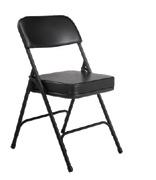

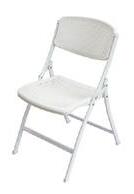
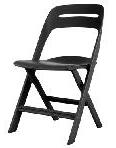













Executive Director, Camp HASC
Author of Baderech: Along the Path of Teshuva (Mosaica 2021)
Mischel EXECUTIVE DIRECTOR, CAMP HASC AUTHOR OF BADERECH SERIES
Few have made a mark on the spiritual and literal landscape of our generation as Rav Shlomo Riskin. The legendary teacher, passionate and independent minded visionary, and Rosh HaYeshiva of Ohr Torah Stone, has dedicated his life to serving the Jewish people. Rabbi Riskin’s accomplishments on behalf of Soviet Jewry, in founding Lincoln Square Synagogue and being one of the primary builders of Efrat, are extraordinary contributions to modern Jewish history.
In his memoir, Listening to God, Rabbi Riskin tells of an acquaintance, a Holocaust survivor whose wife and children were murdered in the war. Rabbi Schwartz remarried, had two sons, and in 1964, the family made aliyah and moved to Eretz Yisrael.
Soon after arriving in Eretz Yisrael, the

Schwartz’s eldest son was killed in action during the Six Day War. Then, in the final days of the Yom Kippur war, their second son, their only remaining child, fell in battle al kiddush Hashem, as well. At the time, Rabbi Riskin was in Israel, visiting as part of a ‘chizuk’ solidarity mission, and described the extraordinary shiva visit at #8 Shimoni Street in Yerushalayim:
There must have been close to a hundred people who had come to try to console them; the Rav and his wife were sitting and not speaking. There was a heavy silence in the room. I stood in the back of the room for about twenty minutes. I didn’t even know if Rav Schwartz remembered me at all. …I began to leave, and, as I did so, I walked past Rav and Rebbetzin Schwartz, saying what one always says when one leaves a house of mourning: ךותב
ראש, “May the Almighty console you among the the mourners of Zion and Jerusalem….”
Rabbi Schwartz looked up and addressed Rabbi Riskin: “Why is the prayer that you express to a mourner addressed to ‘HaMakom’? HaMakom means ‘place’. Yes, in this context it’s a synonym for God, because the whole world is God’s place. But wouldn’t it have made more sense for consolers to say ‘Hashem yenachem etchem, ‘May the God of compassion console you,’ or even ‘May Elokim, the God of judgment, creator of Heaven and earth, console you.’ Why use ‘HaMakom,’ the Place?
“Let me explain what I now understand for the first time. When my family was destroyed in the Holocaust, there was no ‘comforting’ me. It was so senseless, so absurd. But now that I have lost my only remaining sons and we have no chance for other children, I am sad, broken beyond even the ability to speak. Nevertheless, I am comforted. At least this time my sons died so that the Jewish people could live; they died in defense of the Land and People of Israel. They gave their lives in defense of Yerushalayim, for the sake of the Jewish future.
םוקמה, ‘the place’ is Yerushlayim, Eretz Yisrael, our Jewish state. HaMakom menachem oti… — this place comforts me among the mourners of Zion and Jerusalem!”
Since last Tisha B’Av, we have experienced another year of war, with immeasurable losses of family and friends, neighbors, brothers and sisters, who have fallen in service to Klal Yisrael. On this Shabbos Nachamu, may all of us who have shared the challenge of difficult days be blessed to share joyous occasions, see and experience revealed good, with the restoration of Jewish pride and wellbeing.
ונתוא םחני םוקמה, in these days of sacrifice and Jewish heroism, of dedication and rebuilding, ‘the place’ does indeed comfort us; we are ever grateful for the opportunity live in our beautiful, eternal homeland. May all those who mourned personal and national losses on this Tisha b’Av be comforted by the Place, for Whose sake our loved ones gave their lives. May Hashem avenge their blood, and console us, and may we merit ימאהו המילשה הלואג ־
תית, the arrival of the complete and true Redemption.

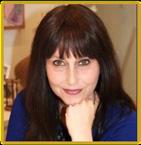

JERUSALEM

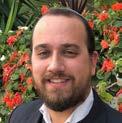
PAGE BY RABBI EZRA FRIEDMAN Director, The Gustave & Carol Jacobs Center for Kashrut Education Director, The Gustave & Carol Jacobs Center for Kashrut Education
The prohibition
Our Sages instituted a rabbinic prohibition against consuming kosher food that was cooked by a non-Jew. This prohibition is known as Bishul Akum. One of the conditions for this prohibition to apply is whether the food is typically eaten raw.
According to Biblical law, food that is completely kosher and cooked by a nonJew is permitted. However, our Sages decreed that such food, even when cooked in kosher utensils, is prohibited for consumption. This prohibition is known as bishul akum. In the coming weeks we will discuss the parameters of this rabbinic prohibition, including the reasons behind the decree, when it applies, and the practical halacha for modern industrial kashrut.
Halachically, if a food is commonly eaten raw (Ne’echal Chai), it is exempt from the prohibition of Bishul Akum. This is because such food lacks the culinary significance or social context that could lead to inappropriate closeness between Jews and non-Jews—one of the primary concerns behind this rabbinic decree.
Food is a very connecting element in every society. That is the basis behind the decree of bishul akum. Our Sages were very concerned about close relationships with non-Jews since intermarriage is a very severe transgression. The prohibition effectively limits Jews and gentiles dining with each other, although there is no specific prohibition against dining with a non-Jew per se. (See Rashi on Avodah Zara 31:b.)
The Gemara (Avodah Zara 38:b) discusses what constitutes a food being “eaten raw.” There are many foods that can technically be consumed raw, although doing so may be either highly unpleasant or extremely rare. A modern example is raw eggs. Some athletes consume raw eggs—often blended into smoothies—for their high protein content, which is believed to support muscle growth and recovery.
Forbidding the non-Jew’s cooking would be enough to create an emotional distance such that families wouldn’t marry into each other.
Rabbeinu Tam (Tosfot Avodah Zara 38:a) and Rambam (Ma’achalot Asurot 17:9)
Despite this practice, the consumption of raw eggs is generally considered unpalatable. Therefore, halachically, eggs are not considered Ne’echal Chai, and cooking them by a
maintain that the decree is based on this issue of closeness to non-Jews that could lead to intermarriage; this is the opinion of most early authorities. However, Rashi and others attribute a different reasoning to the prohibition of bishul akum, which is that non-Jews might mix non-kosher ingredients into the kosher food. In future articles we will discuss whether the parameters of bishul akum are based on both of these reasons or just one. However, it is clear from numerous sources that the danger of intermarriage is the main reason behind the prohibition (See Torat Habayit 3:7).
non-Jew would be subject to the prohibition of Bishul Akum (see Pesakim Uteshvot 113:8).
The Gemara (ibid) discusses a dispute between Rebi Yochanan and Chizkiyah, along with Bar Kappara. The disagreement concerns large fish that are barely edible even after being salted. Rebi Yochanan holds that because these fish are difficult to consume raw—even when salted—they do not qualify as Ne’echal Chai and thus fall under the prohibition of Bishul Akum.
The decree is binding regardless of the reason
Bar Kappara and Chizkiyah, however, argue that even if a food is difficult to eat raw, as long as it is technically edible, it is still considered Ne’echal Chai and may be cooked by a non-Jew.
While early authorities debate which opinion is the accepted halacha, the Tur (YD 113) and Shulchan Aruch (YD 113:12) follow the opinion of the Rashba who rules in accordance with Rebi Yochanan.
The Taz (YD 113:14) further refines this ruling by distinguishing between foods that are nearly impossible to eat raw and those that are merely somewhat unpleasant. According to the Taz, only the former is included in the prohibition of Bishul Akum (see Levushai Oz YD 113:12).
PRACTICAL APPLICATIONS
Since the transgression of intermarriage was the primary concern behind our Sages’ decree, their goal was to powerfully discourage the possibility of developing emotional connections to non-Jews that could lead to intermarriage either in that generation or the next. Accordingly, early authorities discuss whether the prohibition of bishul akum still applies even in situations where intermarriage is not technically possible. For example, Rashba, in his responsa (1:248), examines the case of food cooked by a priest. Being that Catholic priests do not marry nor do they have children with whom to intermarry, is it permitted to eat food cooked by a priest even though the reason for bishul akum seemingly does not apply to
In practice, since the Shulchan Aruch's

The OU Israel Gustave & Carol Jacobs Center for Kashrut Education was created to raise awareness and educate the public in all areas of kashrut. Rabbi Ezra Friedman, Deputy Rabbinic Administrator for OU Kosher Israel is the Center's director. him? Rashba answers that we have a rule regarding rabbinic decrees: even when the reason does not apply, the prohibition still stands. This is a necessary element in every rabbinic prohibition. Otherwise, Rashba explains, people could rationalize and find reasons why any decree should not apply in their particular situation. Accordingly, Rashba concludes that even food cooked by a Catholic priest has the
gentiles, even if the ingredients and utensils are kosher.
The reason cited by most authorities is the risk of intermarriage.
Even in cases with virtually no risk of intermarriage, the food is still prohibited, including non-Jewish royalty, priests, young children, and non-Jews from distant lands. opinion is generally followed, most foods that are unpleasant or difficult to eat raw are included in the Bishul Akum prohibition. As mentioned in previous discussions, Rav Belsky zt”l emphasized that this qualification depends not on how many people eat the food raw, but rather on the nature of the raw consumption itself.
Would this requirement make milk subject to Bishul Akum, since it’s not consumed raw in practice? Later authorities (ibid) rule definitively that pasteurization does not qualify as a halachically significant cooking process in this context. The reason is that the pasteuri-
To clarify: even if thousands of athletes consume raw eggs, their general unpleasantness remains. Similarly, various nutrients and status of foods that are routinely cooked or pasteurized for health and safety. A classic example is milk, which must be pasteurized before being sold commercially in many countries to eliminate harmful bacteria.




is reluctant to send Yishmael away and Yitzchak seeks reconciliation with Yishmael and seeks to bless Esav.
6th Aliya (25:1-11) Avraham marries Keturah; they have 6 sons. All that Avraham has goes to Yitzchak; these are sent eastward with gifts. Avraham dies at age 175; he is buried by Yitzchak and Yishmael in Ma’arat Hamachpelah. Yitzchak is blessed by G-d: he lives in Beer L’chai Roi.
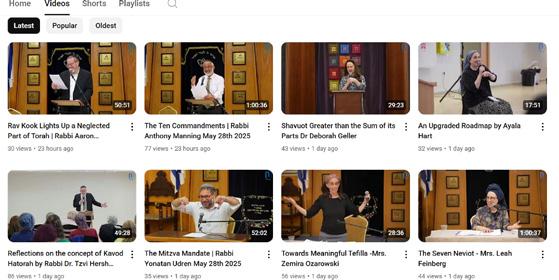
The transition from Avraham to Yitzchak is complete. While G-d has been a silent partner in this parsha, here He completes the generational transfer – He blesses Yitzchak. The Jewish people will be Yitzchak and not Yishmael.

7th Aliya (25:12-18) The generations of Yishmael are enumerated. Yishmael dies. His descendants dwell from Egypt to Assyria. Yishmael’s story is brief. He has numerous and powerful offspring. The brevity
is to emphasize that the Torah is not as interested in the history of power as in the history of the covenant of G-d with the Jewish people. And that will be told at great length.

The theme of this week’s haftorah echoes the theme in our parsha which mentions both the death of Sarah and Avraham.
King David was an older man and a woman was assigned to him to serve him and provide warmth.
Adoniyahu, one of King David’s sons, began to prepare for ascension to his father’s throne. This was despite the fact that King David expressed his wishes that his son Shlomo succeed him.

Tzitzit tying with Ruti
Beit Knesset HaNassi, 24 Ussishkin
Adoniyahu convinces two very significant personalities - the High Priest and the commander of King David’s armies - to
Mondays 1:15-4pm Wednesdays 12-3pm
no experience needed
BY RABBI CHANOCH YERES
www.yeshezra.org

Director: Menachem Persoff
R av, Beit Knesset Beit Yisrael, Yemin Moshe
When Avraham addresses the people of Cheit, trying to acquire a burial spot for his wife, he says “Ger V’Toshav Anochi Eimachem” (23:4) “A Stranger and a Resident am I with you”
NIS 5,000 for each of two families, victims of terror attacks, desperately needing financial help to cope with infirmities and treatment.
This seems to be a contradiction. If one is a stranger than he is not a resident, if he is a resident than he is no longer a stranger. What did Avraham mean?
Gemach for Chatan and Kalla: Meals for wedding and
Sheva Brachot at cost
Eida Hachareidis Hechsher
Website: www.yeshezra.org
The Magid of Dubno (Jacob ben Wolf Kranz 1741-1804) explains that Avraham watched how he spoke in this tense situation in order to, both, state his truth and be able to keep the peace -Shalom Bayit. Avraham said, on the one hand, “I am a Resident’ due to G-d’s promise to receive this Land and on the other hand, I still need your agreement to purchase a plot. In other words, Avraham implied “I am the resident” and you are the “strangers”, while they understood him as saying that “they” are the residents and Avraham is the stranger.
Tel:052-633-1744
Bank Transfer: Mercantile (17), Branch 642, A/C 79747843
Send Asmachta for receipt
The peace was kept, and Avraham remained true to his ideals.
gadgadood@gmail.com
Shabbat Shalom


Checks: “Yesh Ezra,” POB 31476, Romema, Jerusalem
Credit Card: Sara – 077-820-0196 / 058-530-9161
Sun-Wed (10:00am-14.30 pm)
Donate with:

Tax benefit for donations as per section 46a of the Israeli tax code
We are a young senior couple looking for a 1 bedroom furnished apartment in Jerusalem from December 2021-June 2022
Inquiries: Menachem Persoff
050-570-1067 | menpmp@gmail.com
0524419731

simchat shmuel
BY RABBI SAM SHOR DIRECTOR, TORAH INITIATIVES, OU ISRAEL
BY RABBI SAM SHOR Program Director, OU Israel Center
This Shabbat we will commemorate the sacred, yet often overlooked day of Tu B’Av Chamisha Asar B’Av. The fifteenth day of the month of Av is filled with an inner joy that is both mysterious and deeply redemptive. The Talmud (Ta’anit 30b) teaches that there were no days as joyous for the Jewish people as Tu B’Av and Yom Kippur. While Yom Kippur offers the joy of return, Tu B’Av reveals the joy of reunion—of souls, of hearts, of the collective soul of Am Yisrael made whole again.
The Apter Rebbe , the Oheiv Yisrael zy'a, explains the significance of this day through his deep teachings on the Hebrew letters. Every letter, he taught, is a vessel of Divine light, a code of spiritual reality.
Tu B’Av is the fifteenth day of the month of Av(comprised of the letters alef and bet), corresponding to the fifteenth letter of the Alef-Bet, Samech (ס), that offers us a key to its meaning.
Samech is unique among the Hebrew letters: it is a perfect circle, closed and complete. A Samech, like all circles, has a center which is equidistant from all spaces along the circle, meaning no matter where an individual may be standing around that
Mazal
circle, they all remain equally close to the center of the circle. The Sameach teaches us that every individual remains equally close to Hashem, without hierarchy or condition. The Samech symbolizes Divine support, surrounding love, the unshakable embrace of Hashem for every soul.
Tu B’Av reflects that same energy. On this day, the daughters of Yerushalayim would dance in borrowed white garments, in the vineyards; encouraging the young men and women to forge soul-connections not based on tribe or status, but essence and values. The Gemara (Ta’anit 26b) tells us that those who did not have a white dress of their own would borrow, so that no one would be ashamed. Everyone danced together, equal, radiant, and beloved.
The Apter Rebbe, whose life and Torah were devoted to Ahavat Yisrael, would say that the greatest spiritual elevation comes not from asceticism or isolation, but from loving every Jew, regardless of background or level. The circle of the Samech has no corners—no top or bottom, no inside or outside. So too must our love and connection flow: whole, unconditional, and unbreakable.
Perhaps most beautifully, this imagery of the circle refers to the unity we will experience in the days of Mashiach. The Gemara in Ta’anit 31a teaches that in the future, “Hakadosh Baruch Hu oseh lahem machol la’tzaddikim—The Holy One will make a circle dance for the righteous”. Hashem will stand
in the center, and each soul will point and exclaim: “Hinei Elokeinu, Zeh Hashem Kivinu Lo!”—“Behold our G-d, this is Hashem for whom we have longed!”
It will be the final Samech. A circle of redemption. A dance of equality and Divine presence, where no one is closer, and no one is further. Each one will see Hashem from their place in the circle. No competition, only joy and love.
This, says the Oheiv Yisrael, is the spirit of Tu B’Av. A foretaste of the future. A glimpse at that dance that each of us will experience, as we greet Mashiach Tzidkeinu.
Yehi Ratzon, May we be able to take to heart the Apter Rebbe's beautiful teachings, and soon merit to dance in that great circle of redemption, with Hashem at the center, and each of us basking in the light of unity.







RABBI
RAM YESHIVAT HAR ETZION
MAGGID SHIUR ALL PARSHA AND ALL DAF, OU.ORG
Moshe Rabeinu receives final confirmation of the dreadful verdict. Despite all his tefillot, hinted at in the opening pasuk of Va’etchanan, his petition is denied. The man who shaped Jewish history and carried a nation on his shoulders is barred from entering the Land of destiny.
So it is with the Land of Israel. We dream and hope, but sometimes we leave this world without seeing those dreams fulfilled. Sometimes the land remains just beyond our reach—close enough to see, too distant to touch.
Knowing that he will not accompany them to Israel, Moshe fears that the people will fall prey to foreign cultures, slipping into idolatry

and pagan practice. He also worries that material success will inflate their egos and cause them to forget Hashem. Moshe had guided this former nation of slaves through the roaring sea and up the mountain of monotheism. He stood by them in moments of religious collapse, twice pleading for their survival and holding back the threat of divine annihilation. Now, as they approach their homeland, he is gripped by anxiety over the spiritual failures that await them.
Again and again, he warns them of these looming dangers.
And then Moshe turns his gaze toward the distant horizon. This generation had either witnessed the staggering miracles of Egypt and the thunder of Sinai. Or, if born in the desert, they had seen water burst from rocks and bread fall from the sky. Exposure to such divine intervention granted them some immunity against spiritual collapse. While Moshe worries the present generation might stumble—he is not certain. But future generations? He is convinced they will fall.


"When you beget children and children’s children, and become long established in the land..." (Devarim 4:25)
Moshe sees generations rooted in the Land, complacent and forgetful, slowly unraveling. He doesn’t wonder—he predicts. He isn’t warning of a possible downfall—he is preparing for the aftermath of an inevitable
one. And the collapse won’t be mild. It will be catastrophic.
We will be exiled from our Land, scattered among foreign nations. The Jewish condition will reach an all-time low—estranged from Hashem and distant from our Land.
But even in that bleak landscape, Moshe doesn't despair. He carves out a pathway home. This is the Torah’s first blueprint for national teshuva—for collective return.
Moshe outlines two distinct models of collective teshuva—two roads home, each forged in a different crucible of experience.
The first is a lofty and wholehearted return.

Hashem responds, listens and embraces. Even imperfect teshuva, born of fear and crisis, reawakens the eternal covenant. Hashem never forgets the brit with our ancestors, nor does He abandon His people. Even a faltering step toward home is met with divine mercy.
"And from there you will seek the Lord your God, and you will find Him—if you search after Him with all your heart and with all your soul." (Devarim 4:29)
This is not a reactive teshuva, born only of pain. It begins with exile, but does not end there. The word םשמ which refers to a state of dislocation—is merely the catalyst. What follows is a deep, sincere spiritual search, marked by honesty and internal transformation. Suffering awakens the heart, but the heart ultimately seeks on its own. Teshuva becomes a genuine yearning.
But in the very next pasuk, Moshe presents a second model:
To summarize, Moshe describes two profoundly different models of collective teshuva. One form of return is internally driven. It may begin in crisis, but it doesn’t end there. Suffering triggers a deeper religious search, which ultimately becomes independent of the crisis that initiated it.
The second model is the foxhole teshuva— impulsive and born entirely from fear. It lacks the depth and endurance of the first. There is no inner transformation, no deep spiritual reflection. It does not culminate in full compliance or lasting change. It is a cry of desperation—a moment of hearing Hashem’s voice amidst distress, not a sustained return.
Here, teshuva is urgent and desperate. A person is cornered by suffering—
ךל—and calls out in distress. It is not as full or deep as the former; it lacks the phrase ךשפנ
. It is a teshuva of survival, not of vision. Still,
What becomes of this second-tier, crisis-driven yet still valid form of teshuva? Though it may lack the full depth of inner transformation, it still stirs memory and identity. The Torah highlights two formative historical events that anchor the heart of this
teshuva, the second-grade repentance:
—The voice of Hashem thundering from the fire still echoes. Even a fractured heart remembers Sinai. The memory of mass revelation, of standing directly under the Divine word, reverberates even in those whose religious return is incomplete.
second memory is of being extracted from the depths of a foreign nation and led on a miraculous journey to an ancestral homeland. Hashem relocated an entire nation across a vast wilderness to reclaim its destiny.
These two touchstones—the voice at Sinai and the journey toward homeland—tug at the heartstrings of even the hesitant returner. The teshuva may not yet reach full religious observance, but these historical echoes rekindle spiritual identity and awaken dormant longings for Hashem.
Teshuva is not a simple binary, nor an all-or-nothing choice. It unfolds in stages and degrees. Often, an initial, less complete phase of teshuva leads over time to a purer and more noble return. This is true for individuals—and no less so for collective, national teshuva. Even a teshuva born solely from crisis and struggle, without deep inner awakening, is embraced by Hashem. He does not abandon His children and always remembers the eternal covenant made with our ancestors.
October 7th triggered this second form of teshuva. It doesn’t look like traditional teshuva because it doesn’t always show itself in greater observance of mitzvot or full compliance with halacha. Many describe it as an awakening of Jewish identity or a return to
Jewish roots. Yet, in truth, it is the first trace of the very second type of teshuva that Moshe Rabbeinu depicted—a teshuva born from crisis.
This awakening sprang from the deep hatred unleashed by the massacre of October 7th. It emerged from a terrifying surge of antisemitism. The mask came off. Hatred of Jews, unfiltered and raw, flooded the streets and screens.
This teshuva centers on the two historical landmarks that Moshe predicted: Sinai and Israel. Most affiliated Jews connect profoundly to these pillars of Jewish identity. They may not observe the full roster of mitzvot, but they affirm Jewish chosenness— that we were selected by Hashem to receive His word at Sinai and to live a life rooted in divine will. They believe Israel is our ancestral homeland. Hashem led us from Egypt through the desert, and thousands of years later, in a second great migration, gathered us from the four corners of the earth to return once again to our home.
For Orthodox Jews, teshuva often conjures images of heartfelt repentance and increased observance of mitzvot- or Moshe’s first model of teshuva. While we strive toward that ideal, we must also recognize and accredit the second model of teshuva—a form kindled by the trials and turmoil of the past two years.
Famously, the Rambam is cautious about declaring teshuva as a formal mitzvah. In the first perek of Hilchot Teshuva where he outlines the process and experience of teshuva, he does not explicitly state that it is a commanded obligation.
Those who disagree with the Rambam and claim that there is a mitzvah to perform
teshuva point to a phrase that appears twice—in V’etchanan and again in Nizavim: ךיקלא 'ה דע תבשו
They argue that this language clearly implies there is a mitzvah to perform teshuva.
The Rambam, however, interprets this pasuk differently. In his commentary on Hilchot Teshuva (perek 7), he explains that the phrase is not a commandment but a prophecy. It does not command teshuva but predicts that every Jew will eventually perform teshuva. As he writes:
To the Rambam a person does not possess a legal mitzvah to perform teshuva; that is a personal volition. However, every Jew does have a responsibility to believe in the prophecy that, in the end, all Jews will make their way back.
Faith in teshuva and faith in the Jewish people demand believing in this prophecy—even when it feels distant or unlikely. Belief in this prophecy requires that we recognize different forms of teshuva. It may not happen all at once, and not every Jew will choose the first, ideal model of teshuva. Yet, since October 7th, we have witnessed millions of Jews embarking on the second tier of teshuva—reconnecting with Jewish identity, reaffirming Jewish chosenness, and strengthening our claim to our ancestral homeland.
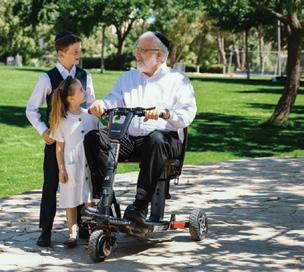
Teshuva wears many faces, but each is a genuine path toward transformation and hope. The only mobility scooter without Gramma!

Rabbi Taragin’s newest sefer entitled “To be Holy but Human: Reflections upon my Rebbe, Rav Yehuda Amital (Kodesh) is now available at: mtaraginbooks.com and in bookstores
SHABBATTO scooter offers a "Mehudar" Zomet-approved Shabbat mechanism that operates according to the "Existing Current Modulation" principle. The Shabbat mechanism is pre-installed and does not require expensive fitting.


Ready to go in 10 seconds. Folds and splits into 2 lightweight parts
For a FREE DEMO Call 077-9562833
For more information, visit our website at: movinglife.co.il/torah24

HAFTORAH BY REBBETZIN DR. ADINA SHMIDMAN
I’m writing from Yerushalayim Ir HaKodesh, where the hills seem to wrap around the city in a quiet embrace. This posuk takes on new meaning, coming alive: םירה םילשורי הל ביבס — Yerushalayim is surrounded by mountains.
It feels less like geography and more like a holy hug. The city is physically embraced — but the emotional comfort requires our presence. She waits not only to be held, but to be heard.
This week’s haftarah begins with that call — not just to comfort, but to bring heart:
DIRECTOR, OU WOMEN’S INITIATIVE

but “בלה לע” — upon the heart. When the heart is too broken to take in words, comfort can still rest gently upon it, waiting until it is ready. Real consolation doesn’t force its way in. It lingers — soft, steady, and patient.
Since October 7, Am Yisrael has been living with raw pain. Hearts are still broken — from grief, fear, and the weight of uncertainty. Families mourn. Soldiers stand guard. Communities hold one another together.
And yet, just as Yerushalayim is held by her hills and comforted by a calm that holds space for love, we too are surrounded — by community, by resilience. But the embrace is not enough. The haftorah reminds us to show up with heart — to speak gently, listen deeply, and offer comfort that is real and lasting.
“Comfort, comfort My people” says your G-d. “Speak to the heart of Yerushalayim”.
The verse doesn’t say “speak to the heart,”

May we feel the hug of Yerushalayim’s hills around us, and may we bring our hearts to comfort her in return. May Hashem’s compassion rest gently upon us, and may we soon see the day when all of Am Yisrael is truly consoled —with peace, with hope, and with love.


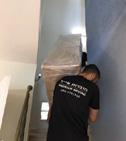










Celebrating the thousands of Olim who are making Aliyah this summer!
May - September 2025 | nbn.org.il/flights
Are you a doctor or medical student thinking of Aliyah? Join us to discuss what Aliyah can look like for you!
August 17, Rockland County | August 18, Queens
This is your chance to meet with Nefesh B’Nefesh and get answers to your Aliyah questions.
September 2025 | Queens, Brooklyn, West Hempstead
It’s a summer of culture and air conditioning! NBN invites Jerusalem seniors for a summer series of museum tours.
July - August 2025 | Jerusalem
Supplement your existing Hebrew skills with the words and insights you need to survive & thrive in Israel.
July - August 2025 | Online
Our dedicated NBN staff offer one-on-one assistance to help you navigate and understand any challenging Hebrew task.
Tuesdays | NBN Aliyah Campus JLM
www.nbn.org.il/all-events


AUGUST 20, 2025
7:00 AM Israel Time 12:00 AM EST*
*Subject to change
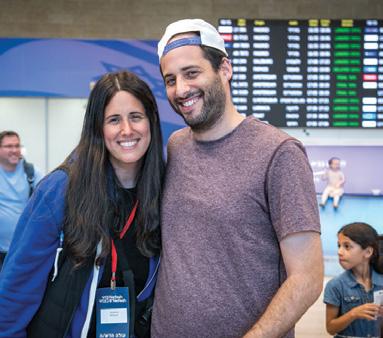






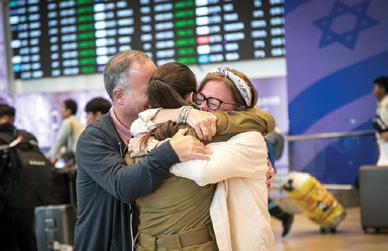



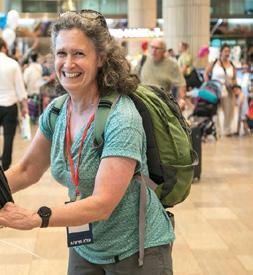

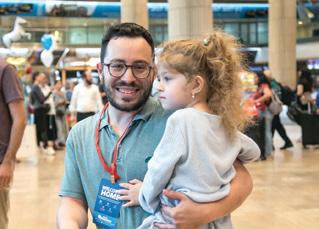
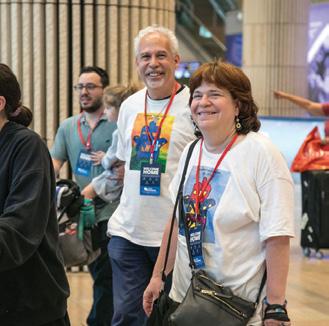

Celebrating Over 1,000 Dreams Taking Flight this August 2025
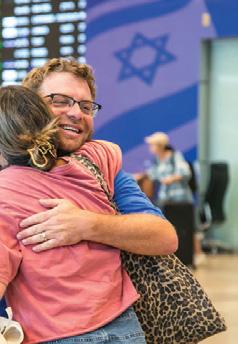


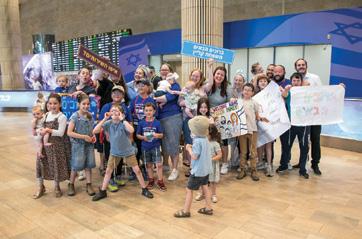



REBBETZIN ZEMIRA OZAROWSKI DIRECTOR OF OU ISRAEL WOMEN’S DIVISION
This week’s parsha, Va’etchanan, opens with one of the most poignant moments in the Torah: after leading Am Yisrael through the desert for 40 years, Moshe Rabbeinu begs Hashem to let him enter Eretz Yisrael. He “longed,” the midrash says, with 515 tefillot, yearning to step foot in the Land of Israel, to come closer to Hashem, and to fulfill more mitzvot.
That longing is something we can – and must – pass on to our children.
POST–TISHA B’AV REFLECTIONS
We’ve just sat on the floor, cried, and mourned the churban. But Tisha B’Av isn’t meant to leave us in sadness – it’s meant to awaken a yearning that carries us forward. Right after Tisha B’Av, we move into the “Shivah D’Nechemta,” the seven weeks of comfort, and start focusing on rebuilding that longing for geulah. This is the perfect moment to turn our own tears and hopes into something tangible for our children.
For centuries, the Jews of Ethiopia lived with a powerful, unshakable longing for Yerushalayim and the Beit HaMikdash. Believing the Mikdash still stood, they would tell their children stories of the splendor of the Avodah, of the Kohanim serving, of the
Shechinah resting there. That longing was so alive, so real, that when the gates of Aliyah opened, thousands set out on foot – walking hundreds of miles through deserts and danger, often risking and even losing their lives – just to reach Yerushalayim.
If they could pass down that dream for generations, how much more so can we, living in the land itself, keep that dream alive for our children?
DO WE KNOW WHAT WE’RE FIGHTING FOR?
Many soldiers returning home from fighting in Gaza have shared a striking observation: in nearly every single house they entered, there was a picture of the Al-Aqsa Mosque. Their takeaway was simple but powerful:- “They know what they’re fighting for, we need to make sure we know what we’re fighting for.”
This statement should stop us in our tracks. It forces us to ask ourselves: Have we instilled in our children a clear understanding of what we are fighting for? Have we painted for them a vision of what we are dreaming about, longing for, and ultimately living for – the day when the Beit HaMikdash will stand once again, and Hashem’s presence will be felt in the world with total clarity?
If we want our children to truly long for the Beit HaMikdash, we have to speak about it –not once a year, not only on Tisha B’Av – but all the time. We need to weave it naturally into our conversations, into bedtime stories, into the way we talk about the future. We need to paint a tangible picture by saying things like:
“One day, we will stand together and hear the Leviim singing in the Beit haMikdash.”
“One day, we will bring korbanot and feel an even deeper closeness to HaKadosh Baruch Hu.”
“One day, Hashem’s presence will be so clear in the world – there will be no more confusion, no more doubt.”
We need to let our children see the dream. We need to hang pictures of Yerushalayim and the Beit HaMikdash in our homes and to sing songs about it at the Shabbat table. When we visit the Kotel, we need to speak not only about what once stood there – but about what will rise again.
Because if we don’t talk about it, if we don’t paint that picture, the dream begins to fade. But if we do – if we make the Beit HaMikdash as real and alive in their minds as Moshe’s longing was in his heart – we give our children one of the greatest gifts of all: a yearning for the future. And in these days after Tisha B’Av, when the pain of the churban is still fresh but the hope of rebuilding is even stronger, we have the perfect opportunity to plant that longing deep in their hearts. If we do, they will carry that yearning through their lives – and maybe, with Hashem’s help, they will be the generation to see that longing fulfilled.


RABBI AARON GOLDSCHEIDER EDITOR, TORAH TIDBITS RAV, THE JERUSALEM SHUL BAKA, JERUSALEM RABBI AARON GOLDSCHEIDER
The Shema is one of the most familiar obligatory prayers. The body of the text is recited two times a day, to the point of flowing from memory. More elusive is the soul of the prayer, that is, its essence and core principles. Thankfully, Rabbi Joseph B. Soloveitchik, following in the footsteps of his forbears, illuminated the spirit behind the words for us.
Rabbi Chaim ha-Levi Soloveitchik, the Rav’s grandfather, deemed the birchot keri’at Shema, the blessings that are the introduction and afterward to the Shema, integral to fulfilling the mitzvah. For this reason, he held that it is preferable to pray without a minyan and recite the Shema with its blessings at the proper time, rather than pray with a minyan and miss the proper time for the blessings.1 Birchot keri’at Shema are inseparable from the Shema itself; they lend it its religio-philosophical meaning. Let us examine them more closely through the Rav’s eyes to see what they can reveal about the Shema.
The Rav noted that the most complex berachah (blessing) in our prayers is the first of the birchot keri’at Shema, from two 1. Schachter, Nefesh ha-Rav, 114.
perspectives: its structure and central theme. The formula of the berachah is: “Blessed are You, Lord... who forms light and creates darkness, makes peace and creates everything.” This blessing is recited in the morning, so why mention darkness? Furthermore, what is the relevance of peace and overall creation here?
The Talmud points us to the source material from which this berachah was crafted. The verse says, “who forms light and creates darkness, makes peace and creates evil” (Isaiah 45:7).2 The Sages emended the last word from “evil” (ער) to “everything” (לֹכה) to teach that from the divine perspective, which encompasses everything, evil has no true reality. When viewed within the context of all creation, it simply ceases to exist. This opening blessing conveys that we bless God not only for the “light” but also for the “darkness,” because we have faith that “everything” emanates from God, without divisions. There is only yichud Hashem, God’s absolute unity, from which all existence springs.3
This has direct bearing on the character of the Shema and the appropriate kavanah (intention) for it, because the Shema is a “form of a declaration, a profession of faith.” The Rav contrasted this with prayer, such as the Amidah, which demands a certain state of awareness of encountering God. In the language of the Sages, the 2. Berachot 11a. 3. Grodner, Al ha-Tefilah, 77–78.
first verse of the Shema focuses on yichud Hashem, the first passage on the acceptance of ol malchut shamayim (the yoke of Heaven), and the second passage on accepting the mitzvot. In our daily recitation of the Shema, we affirm and reaffirm the core principles of Judaism.4
Rabbi Dr. Norman Lamm, a close student of the Rav who wrote an entire volume on the Shema, pointed out that this motif of religious commitment is graphically represented in the very text we recite. Scribal tradition dictates that the ayin in the first word shema (עמש) and the dalet in the last word echad (דחא) be enlarged. The two complementary reasons offered for this graphic highlighting reinforce the notion that the Shema is a pledge or testimony.
Rabbi David Abudraham explained that the two enlarged letters (ד-ע) spell the Hebrew word for witness (דע): the recitation of the Shema testifies to our faith before God, our fellow man, and ourselves. Furthermore, one can say that these letters are maximized so as to eliminate any room for error. In other words, the ayin is given prominence to distinguish it from alef; otherwise, one might read the first word of the Shema as “perhaps” (אמש). The dalet is likewise oversized so that it not be mistaken for a resh in the last word and read as “other” (רחא). Although roteness would prevent us from actually making
Diamonds, Gems, Precious Stones, Jade, Carvings, Fine Mineral Specimens, Etc. *** Alan Sussman, “The Collector” *** 052-854-4504 Please call
these mistakes, the theological point is clear. We do not waver, nor admit the possibility of other powers, in crowning God. The ayin and dalet that jump out at us from the text serve as reminders to jettison any doubts or hesitations.5

The Shema consists of three biblical passages, yet we interpolate one non-scriptural line into our recitation: “Blessed be the name of His glorious Kingdom forever and ever.” The Talmud explains the significance of this phrase which follows the initial verse of the Shema. It goes back to a conversation between Yaakov and his sons that occurred before his passing.
Yaakov wished to reveal to his sons the end of days, but the holy spirit withdrew from him. He said, “Perhaps, God forbid, there is a defect in my bed, like Avraham who had Yishmael and my father Yitzchak who had Esav.”
4. Koren Mesorat HaRav Siddur, 108 and 111. Accepting a yoke indicates discomfort and sacrifice for the sake of a higher goal (Chumash Mesoras Harav, 5:180–181).
His sons said to him: “Hear, Yisrael, the 5. Lamm, The Shema, 16-17. The Talmud compares someone reciting the Shema without tefillin to someone giving false testimony, implying that the recitation is a kind of testimony (Berachot 14b).
Lord our God, the Lord is one. Just as there is only one in your heart, so there is only one in our hearts.”
At that moment our forefather Yaakov said, “Blessed be the name of His glorious kingdom forever and ever.”6
The Rav pondered why the Rambam decided to include this story in his Mishneh Torah, since the legal code usually does not feature Midrash. He suggested that the Rambam wanted to underscore that unlike the Amidah, the Shema is not interested in communing with God. Its recitation—or rather declaration—is an act of “self-identification with the history and destiny of our people.”7 The Shema is a kind of intergenerational attestation of faith.
The Zohar notes that in the Midrash above “Yisrael” is Yaakov. Two times a day we address Yaakov, as it were, declaring that we still hold true to his faith.8 Perhaps this explains why the Levush made kavanah for this line absolutely necessary for fulfilling the mitzvah of keri’at Shema. Without it, the declaration that is the Shema remains incomplete.9
The faith attested in the Shema is not some abstract credo that we simply carry on from generation to generation. It plays a pivotal role in our lives. The third paragraph commands us to wear tzitzit, to teach us how to stand firm when our willpower is tested on a daily basis. Affirming our faith multiple times a day strengthens our resolve. To this end, the Rav cited an unforgettable story
6. Pesachim 56a.
7. Koren Mesorat HaRav Siddur, xxviii.
8. Zohar Chadash, 93b (Midrash Ruth).
9. Levush ha-Techelet, Orach Chayim, 63:5.
recorded in the Talmud:
There was once a man who was meticulous about the mitzvah of tzitzit. He heard there was a prostitute in a city overseas who took four hundred gold coins as her payment. He sent her four hundred gold coins and made an appointment. When his time arrived, he came and sat at the entrance.
Her maidservant told her, “The man who sent you four hundred gold coins has come and is sitting at the entrance.”
She said, “Let him enter.”
He entered. She arranged seven beds for him, six of silver and one of gold. Between each was a silver ladder, and at the top was a golden one.
She went up and sat naked on the top bed, and he too ascended to sit naked facing her. His four tzitzit then came and slapped him on his face. He dropped down and sat himself on the ground, and she also dropped down and sat on the ground.
She said to him, “By the gappa of Rome, I will not let you go until you tell me what defect you saw in me.”
He said to her, “By the Temple service, I have never seen a woman as beautiful as you. But there is one mitzvah that the Lord our God commanded us called tzitzit, about which it is written twice: “I am the Lord your God” (Numbers 15:41). I am the one who will punish [transgressors], and I am the one who will reward [the faithful]. Now [the tzitzit] seem to have appeared to me like four witnesses [to testify against me].”10
A person encounters innumerable stumbling blocks. Affirming faith in God twice daily strengthens one’s spiritual resolve.
10. Menachot 44a, cited in Grodner, Al haTefilah, 76–77.
The Rambam begins his laws of keri’at Shema as follows: “We recite the Shema twice daily....”11 The Rav concluded from this that the Shema is a single mitzvah divided into two parts, rather than two independent obligations. It follows that reciting only the morning or evening Shema does not discharge one’s obligation.12 Why should this be the case?
To answer this, the Rav drew on two episodes in Jewish history when the Shema was recited by a seminal figure. First, Yaakov descended to Egypt to finally reunite with his long-lost son, Yosef. When they embraced, Yaakov affirmed the yoke of Heaven with unbridled joy, as he could see that everything that had happened was part of God’s plan. It was a bright time. The words of Shema were an expression of love. By contrast, when Rabbi Akiva recited the Shema, accepting his fate as a divine decree, he was suffering extreme torment at the hands of the Romans. His death dealt a blow to budding hopes of overcoming the oppressors. It was a dark time.13
The morning Shema is when one sees God’s hand at work in the light of day, when the declaration of faith comes easily. The evening Shema is when God’s hand is hidden in the waning or absent light, when it is excruciatingly difficult to believe because everything indicates otherwise.14 The mitz-
11. Mishneh Torah, Hilchot Keri’at Shema, 1:1.
12. Genack, Shi’urei ha-Rav, 33. The Ramban noted an inconsistency in the Rambam’s conceptualizations, since he counted the hand and head tefillin as separate mitzvot. Clearly, there is something deeper at work here with the Shema, as explicated in the continuation below.
13. Chumash Mesoras Harav, 1:343.
14. For the Rav’s take on finding God in the darkness and bewilderment of life, see
vah of the Shema lies in two acts, so that the unshakable faith of the Jew is fully voiced.
The Rav thought that this is reflected by the halachic requirement to say Emet ve-Yatziv after the morning Shema and Emet ve-Emunah after the evening Shema. 15 The word yatziv denotes stability and abiding presence; one can lean on God. Emunah, on the other hand, requires drawing the strength and courage to reach out for God in the darkness, even when His presence is not visible.
The intrinsic connection between the two recitations of the Shema also emerges from the total number of birchot keri’at Shema said daily. In the morning the Shema is enveloped by three blessings, and at night the Shema is accompanied by four.16 Rashi there sourced this number to the verse, “Seven times a day do I praise You” (Psalms 119:164). This seven may allude to the seven blessings that mark a marriage, a relationship of total devotion. Through thick and thin we remain with God, knowing that He reciprocates.17
Grodner, Al ha-Tefilah, 177–179.
15. Berachot 12b.
16. Berachot 11a.
17. Grodner, Al ha-Tefilah, 72.

Rabbi Goldscheider’s most recent OU Press Publication, “Torah United” on the weekly Parsha, can be ordered directly from Rabbi Goldscheider at aarong@ouisrael.org at a special price for Torah Tidbits readers.
A small Sefer Torah with its own Aron Kodesh is available to shiva houses or for any other necessary occasion on a temporary free-loan basis. If needed call Uri Hirsch: 0545513173

RAV DANIEL MANN
Rav Daniel Mann
a store that does not take off ma’asrot.
Question: I understand that it is not practical to give teruma and terumat ma’aser to a kohen because he cannot use it (see this column, Bamidbar 5778) and we cannot eat ma’aser sheni in Yerushalayim with its rules, but shouldn’t we give ma’aser rishon and ma’aser ani to levi’im and the poor, respectively?
Answer: The discussion breaks up into two parts. 1) Ma’asrot to which hafrasha (“taking off” – they are actually described as being set aside but only the trumot , not the ma’asrot are physically taken off) at processing centers, which is done on a mass scale. In that case, on the one hand, the mitzva is significant but on the other hand, it is daunting (one competes in the market with people who will not be taking off close to 20%). 2) Ma’asrot from produce that grew in one’s garden or was bought in
1) The major kashrut organizations do not require that the ma’asrot that were declared were given. Although there is an opinion that hafrasha that was done with an intention not to give is invalid, the consensus is that failure to give does not invalidate the hafrasha; therefore, that produce is not tevel (Shut Har Tzvi, Zeraim I:44). Regarding ma’aser rishon, going to a levi, it has become standard to rely on the idea (Chazon Ish, Shvi’it 5:12) that since the practice is that that we give aliyot to levi’im just on their word, we do not want a situation in which one has significant financial benefit by claiming he is a levi. (It may be relevant, that on the level of spirit of the law, the mitzva is intended to compensate members of the tribe for their full-time involvement in the nation’s spiritual needs (see Bamidbar 18:31).)
There are obviously poor people who can prove their poverty, and so it is more difficult to not give to them. Presumably, kashrut organizations suffice with making the produce permitted to eat, and leave the decision of whether to give ma’aser ani (see below a way it can be done) to the farmer, who will also consider his ability to stay profitable.
2) Most produce in Israel undergoes the taking of trumot and ma’asrot at processing
Eretz Hemdah, the Institute for Advanced Jewish Studies, Jerusalem, is headed by Rav Yosef Carmel and Rav Moshe Ehrenreich, founded by Rav Shaul Yisraeli, zt”l, to prepare rabbanim and dayanim to serve the National Religious community in the Israel and abroad. Ask the Rabbi is a joint venture of the OU, Eretz Hemdah, and OU Israel’s Torah Tidbits.

or distribution centers. Therefore, even if one buys at a supermarket without a hechsher, it is rarely more than a safek whether it needs further tithing. Under those circumstances, one does not have to give the ma’asrot he “took off” (see discussion in Mishpetei Eretz, Trumot U’maasrot 17:2).
In regard to that which grows locally or can be traced to a process that does not include hafrasha, the situation is as follows. Regarding ma’aser rishon, some still rely on the Chazon Ish and do not give. Presumably, it would be wonderful to have a levi to give the portion of the produce that corresponds to the ma’aser, as a levi would likely be pleased to give expression to his levi status; he could then either keep the produce or give it back. Regarding ma’aser ani, it is usually not very useful and actually insulting to be designated a recipient of ma’aser ani and receive minimal benefit from it. A halachically practical system is to lend money to a poor person of an amount that corresponds to the expected value of all the ma’aser ani of that period. The loan works with the condition that it will be paid back only with the ani’s nominal (non-physical) acceptance (as ma’aser ani) and return (as loan payment) of the produce to the giver (Mishpetei Eretz ibid. 9). Because arranging all of this is not so simple, fine organizations (that deal with land-based mitzvot) arrange everything and have people sign up and pay a set fee, which includes the money for the loan that halachically facilitates the ma’aser giving. The
same can be done regarding giving to levi’im. It can also work for farmers, who would have to give a lot more than a non-producer, but for whom there is also a mechanism that makes it much cheaper than 10% of the market value of his produce (details are beyond our present scope).

For a Din Torah in English or Hebrew contact: Eretz Hemdah–Gazit Rabbinical Court 077-215-8-215 • Fax: (02) 537-9626 beitdin@eretzhemdah.org

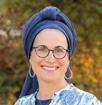
TORAH TIDBITS CONTRIBUTOR
When I was a kid and went to sleepaway camp, I would yearn for letters from my family and friends like a person waiting for a life-saving prescription. My thirst for connection and words of love was endless and I wanted reassurance that I had not been forgotten.
Of course, receiving letters is often dependent on writing them. The more diligent I was in writing, the more responses I got.
And so too with Hashem.
I want so badly to feel His love for me. For us.
When I daven, I know I have a better chance of connecting. A better chance at receiving His love letters. At feeling confident He’s sending them.
But this year it has become increasingly challenging to voice words of love and devotion to Hashem with real emotion. Because I’m not feeling it.
The explosion of hatred for Am Yisrael, the constant barrage of words and missiles, the distortion of reality. All of it pushes me to a place of self-protection and numbness.
Of silence.
And I don’t want that.
We never come to a place of healing through
silence and withdrawal. Only through open hearted sharing and expression.
But it’s really hard to start the conversation. I turn to Rav Shimshon Raphael Hirsch’s definition of Tefillah for a way forward. In his Torah commentary on Beraishis, Rav Hirsch explains that the root of ללפתהל is ללפ.
The first time this word shows up in Torah is when Yosef brings his children to Yaakov Avinu to be blessed at the end of Yaakov’s life. The Torah tells us that Yaakov expresses delight and wonder at having the chance to do this.
And Israel said to Joseph, “I never expected to see you again, and here G-d has let me see your children as well.” (Beraishis 48:11)
In his beautiful wording, Rav Hirsch explains that ללפ is related to ללב which means to combine two separate physical components to the point where they become one. Like pouring instant coffee into boiling water. Once they are mixed, they merge completely to form an entirely new substance.
ללפ is that in spiritual form. Meaning, taking an idea and injecting it into a thought until there is integration and transcendence.
Since ללפתהל is a reflexive verb, Rav Hirsch explains, it means injecting ourselves with truths from Torah and Chazal, with the beautiful words of tefillah, until these concepts merge into our souls and imbue us with a new strength.
Input, not output.
Tefillah is not an outpouring of what we
currently feel but rather an infusion of the love we want to know.
Tefillah then becomes a vitamin. Taken every day, its cumulative effect causes a fundamental shift in our spiritual health. It becomes a source of comfort.
May Hashem bless us all with the awareness of this very powerful spiritual prescription, with the privilege to utilize it daily to build ongoing relationship with Our Creator, and with the courage to hear the words of tefillah as love letters from Him, even if spoken in our own voices.
Shabbat Shalom.
Shoshana teaches Chassidus for the Shirat David Community in Efrat as well as in Jerusalem for Midreshet Rachel v’Chaya and Shiviti Women’s Institute. She is a guide in Poland with JRoots and co-leads inspirational trips to Ukraine and around Eretz Yisroel. Shoshana has also been a guide at Yad Vashem since 2014.

MOSHAV ADERET
Breezy, 9 room villa, 215m² on c 1/2 dunam, garden, forest view. Option sep unit AirBNB set up with pool Asking ₪6.1m
RAMAT BET SHEMESH
Harmony Independent Living, balcony, concierge, shul, gym. Flexible entry / Investment 2 rooms - ₪1.62m 3 rooms - ₪2.95m




HOMESTEAD OPPORTUNITY
7 room house in quiet location with breathtaking view 166m 1.44 dunams + .722 in future. Asking ₪3.65m
ASKING ₪2.68m Spacious 4 room, 2 bath, 2nd floor apt, shabbat elevator, large salon, dining area, parent’s suite 19m² balcony, view Income producing with flexible entry. Mishkafayim Ramat Beit Shemesh
To view or list your property here Call ILAN on: 050-491-0604 or e mail: office@ilanrealestate.com







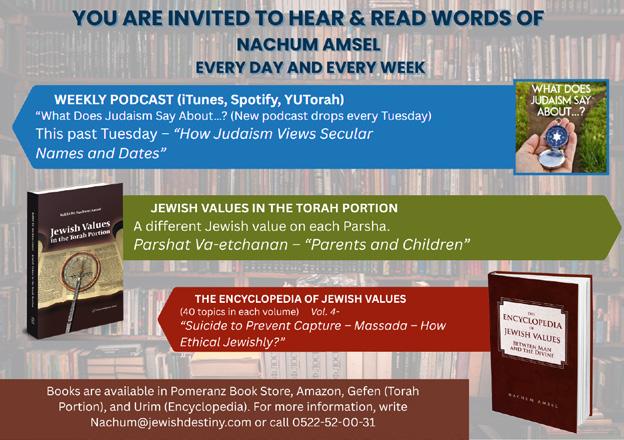


OU ISRAEL FACULTY

As our study of Sefer Mishlei continues apace with the preparations for my daughter’s upcoming wedding, I can’t but reflect upon the teachings of Shlomo HaMelech regarding the role of the Jewish woman. Rav Shimshon Raphael Hirsch cites the verse: “ בוט אצמ השא אצמ - He who has found a wife has found great good” (18:22), and observes that “The text does not read: ‘Who has found a good wife,’ but merely ‘a wife.’ Obviously, the concept of ‘wife’ incorporates good; a fault in her disposition is tantamount to a lack of femininity.”1
The ability of the woman to influence her home is built into Creation. Describing the creation of woman, the verse states: “חקיו הנתחת רשב רגסיו ויתועלצמ תחא - Hashem took one of the sides of Man, and sealed the flesh beneath it.”2 The midrash interprets the pasuk to mean that Hashem sealed the influence of woman over man, and illustrates with an anecdote: There was once a pious couple who were married for many years and remained childless. They decided to divorce and each remarried an evildoer.
1. Samson Raphael HIrsch, From the Wisdom of Mishlei p. 241 2. Bereshit 2:21
The woman succeeded in transforming her second husband into a righteous man, while the man was influenced by his wife and became an evildoer.3
This principle is found in Sefer Mishlei as well. Shlomo HaMelech taught: “תומכח
- A woman of much wisdom has built her house, while a foolish woman destroys her home with her own hands” (14:1) Rav Hirsch elaborates: “The wife is actually the builder of the home, and this is no simple art. The guidance of domestic life, entrusted to her hands, comprises an abundance of seemingly minor relationships; but the wise or unwise handling of these can be so decisive for the comfort, prospering and happiness of the home that המכח, simple wisdom, is not sufficient. Rather תומכח, a whole combination of knowledge, insight, abilities and skills, as well as moral virtue and spiritual excellence, make up the art of the wifely home builder.”4 This truth is reflected in the marriage ceremony, as the bride circles the groom seven times under the Chuppah, symbolizing that she is building the walls that will encircle the new home being established. It is the wife, as the תיבה תרקע, the mainstay of the home, who establishes its boundaries and moral underpinnings.
Sefer Mishlei concludes with Shlomo HaMelech’s paean to the woman of valor, 3. Bereshit Rabbah 17:7 4. SRH, From the Wisdom of Mishlei pp. 245-6
a woman who excels in all spheres of life. It is interesting to note that in all of Sefer Mishlei, Shlomo HaMelech uses the term “ימ
אצמי - who can find?” exactly twice - once in reference to the woman of valor, and once in reference to the man of faith: “ ומא שיאו ־
אצמי ימ םינ - who can find a man of faith?” (20:6). Each is an expression of something of great and rare value, a woman of valor and a man of faith, and lauds an attribute ordinarily associated with the opposite gender. ליח, valor, is ordinarily associated with the male, while הנומא, faith, is a quality more inherent to women. When man and woman form a bond of faithfulness with one another, they combine to reflect the bond between man and G-d, a bond of love and faithfulness that endures forever.5 Man and woman were created as one entity, with both male and female characteristics. When man and woman unite in the service of G-d, these characteristics are given their fullest expression, each enhancing the qualities of the other and helping them to develop. The Maharal teaches that a woman has two dimensions - who she is when she is born, and who she becomes through association with her husband. Hazal teach that a man who marries a woman for the sake of Heaven is considered as if he gave birth to her. Marriage enables the woman to develop aspects of her personality that otherwise may remain latent. Thus Sarai, before her marriage to Avraham, was already spiritually superior. Through her association with Avraham, she became Sarah. Her spiritual intuition, which had been inner directed, was channelled into
5. Maharal, Netivot Olam Netiv HaEmunah
outreach and she became a teacher of women, an Eishet Chayil in her own right.6 May we all merit to see Nachat from our children as we escort them to the Chuppah and beyond.
6. Gur Aryeh, Bereshit 11:29 Ilana Nelson
Mrs. Leah Feinberg is a master educator who taught at the SKA High School for Girls in Hewlett for twenty-one years, also serving as Tanach Department chairperson and New Teacher Mentor. Leah is currently on the faculty of the OU Israel Center and has taught in all three cycles of the OU Women’s Initiative Nach Yomi program
In the OU Women’s Initiative Nach Yomi series, currently in its third cycle, women scholars deliver a daily shiur on the books of Prophets (Neviim) and Writings (Ketuvim) at the pace of a chapter a day. Shiurim are geared toward learners of all levels who would like to participate in the twoyear Nach Yomi study cycle. Visit the OU Women’s Initiative to register for additional content.


GARDEN PARADISE IN KATAMON FOR SALE
PEACEFUL, BEAUTIFUL, GARDEN DUPLEX APARTMENT
124.5 SQM ON TWO LEVELS, 4.5 BEDROOMS, 3 FULL BATHS, PRIVATE GARDEN IN TABU FULL OF FRUIT TREES, PRIVATE PARKING, ELEVATOR, MAMAD, EXCELLENT CONDITION.
ASKING PRICE: NIS 8,150,000
ADDITIONAL 2 ROOM UNIT FOR SALE DIRECTLY ABOVE THE GARDEN APT. PERFECT OFFICE/GUEST UNIT! COMPACT 34 SQM., INCLUDES MAMAD, SUKKAH BALCONY, PRIVATE HEAT AND A/C.
ASKING PRICE: NIS 2,200,000

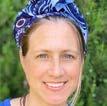
Michal Silverstein, MS
Dear T.R.
Michal Silverstein, MS
Thank you for asking this very relevant and timely question.
Adults as well as children are overwhelmed with emotions when they hear about a terrorist attack. When they become more frequent, the feeling of uncertainty and loss of control can create much anxiety. There are certain guidelines to keep in mind
One of the many jobs a parent has is to set boundaries. It’s not always easy to lay down the law and follow through, but ultimately it’s a way that children feel their parents protection.
For Sale:

the questions they ask. Stay focused. necessary to elaborate or get sidetracked politics or other similar situations. tions should be given in an age appropriate manner. Just like your rules are age priate your discussions should be Having more detailed, graphic conversations is more appropriate with an 18 than old.
The important question to ask yourself before making a rule is if it’s something you can stick to. Is it a rule that you can follow through with? One way to decide if the rule will be successfully implemented is to ask yourself if it aligns with with your values, if it’s consistent with your way of life, and are you and your spouse on the same page regarding enforcing this rule?
25 Ben Maimon, 4 rooms, 113m, 2 bathrooms, porch, 1st floor, elevator, 6.2 million NIS
Smadar 050-3114040 // 02-642-4329 smadi_bida@walla.co.il
70 TORAH TIDBITS 1514 / EMOR
If you are vague with children / teens, they will find the loophole. So, be sure you know what’s important to you and why.
Many kids tend to whine and negotiate with parents when they are given a hard NO. This likely happens when there is precedence for this type of negotiation. Kids are smart! If they’ve succeeded in getting their way before, by whining and negotiating, they will try it every time. Kids realize when their parents are not 100% aligned with their rules or with each other. The more the parent negotiates and gives into the child the less capable the child is to accept rules. And the more likely
the whining will escalate into fits or tantrums. As your child grows, new situations will present themselves. Either your child will grow into a new stage or you will be confronted with a new cultural norm and you will have to decide how to best handle it. Sometimes parents don’t know right away what to do or what rule to enforce. That’s okay. Sometimes parents need time to discuss with each other or consult with others before making a decision. This also models the decision making process for kids and teaches them to sit with uncertainty until there is a clear decision. Once parents have discussed, consulted and weighed the various factors they should be clear with their child.
It’s important to keep an eye out emotional and physical signs of If your child looks sad, has crying becomes fearful or angry or is experienc ing changes in sleeping and eating he may need extra help processing rent state of events. Be aware of behavioral changes.
Regarding your own emotional important to model emotions in front children. Seeing you express your will allow your child to do the same. being said, there is also a limit. You
Make sure to know what your red lines are before making it a rule and trying to enforce it. As children grow they will respect adults who are consistent with their rules and values.
Feel free to send in any parenting questions you may have to parenting@ouisrael.org (Details will be changed to preserve anonymity).
Michal Silverstein has a MS in educational psychology and counseling. She facilitates parenting workshops in and around Jerusalem and maintains a private practice.
Walking down King George St. in Jerusalem and want a cold bottle of water?
Come help yourself to a bottle at 52 King George.
In loving memory of Yoni’s wife Tziporah a"h, a true Eishes Chayil, always full of chessed, kindness and laughter, and brought life and strength to so many people, that she touched! She was like Aron, who loved peace and pursued peace.

Yoni thanks Hashem for having the opportunity of having Tziporah in his life, to learn of her caring, patience and happiness, to overcome her challenges. May Tziporah's Neshama be a light onto the world, in a time of darkness, and may her Neshama shine to Gan Eden. Yoni misses Tziporah with tears in his eyes, as Hashem gave him a gift, a crown jewel, now he returns her to Hashem. With thanks and Toda. Love, Yoni
To help refill the supplysend tax deductible donations for Be’er Tziporah a"h Bottled Water Gemach to Chabad of RechaviaRabbi Yisroel Goldberg email Rabbi@JerusalemChabad.org 02 800-1717 www.JerusalermChabad.org/DonateShekels בוט יכ 'הל ודוה
Flying Soon?
Travel with Confidence
1UniTravel - Medical Insurance at great prices Choose from multiple options 1unitravel.brokersnexus.com
1UniSim - Sims for USA and Worldwide Starting at $40 sales@1unisim.com
Call 077-400-3199 or USA 718-715-0001
IN THE GERMAN COLONY
Beautiful & spacious, 119 sqm, 4-room garden apartment, new building, fully accessible, surrounding garden & courtyard, perfect location: near quality schools & synagogues, shops & cafes, museums – theaters & cinemas, community & cultural centers. Exclusive! Matan 053-4644480
ON SHMARYAHU LEVIN ST. (NEAR BAYIT VAGAN)
A huge 240 Sq.m. nicely renovated cottage 6.5-rooms, large garden & roof terrace, green pastoral view from every window, parking & storage, Exclusive! Anat 053-6725042
IN HAR NOF
Beautifully renovated 4-room, large sukkah terrace, use of surrounding garden, quiet & green, near playground, synagogues, commercial & community centers, schools, public transportation. Itsik 055-4318147
MAGNIFICENT PRIVATE HOUSE FOR SALE IN THE GERMAN COLONY
Beautiful, rare Arab-style 6-room “stand alone” house, 217 Sq.m. on a large plot, 500 Sq.m beautiful surrounding garden, original floors, high ceilings, quiet pastoral location, minutes walk from Emek Refaim shops and restaurants, Orient hotel, First Station and more. Exclusive! Galila 053-6642512
3 Moshe Hess St. Jerusalem 0778038511
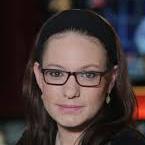

BY SIVAN RAHAV-MEIR
BY SIVAN RAHAV-MEIR
It was a moment I don’t think I’ll ever forget.
the first time?' Yet I simply forgot it. I thought afterwards that HaShem caused me to forget the answer in order to remind me that I do not know everything, that I am human and not perfect."
Eliyahu continued: “Today is Elyakim’s first yahrzeit. But it’s also the anniversary of your salvation. You were granted life. I ask that you be happy today, also in memory of my Elyakim.
the first time?' Yet I simply forgot it. I thought afterwards that HaShem caused me to forget the answer in order to remind me that I do not know everything, that I am human and not perfect."
“And I want to ask something else. You didn’t answer me, and that’s okay. Take your time.
Much excitement has surrounded Emunah Cohen and Neta Lax, the two fresh winners of the annual International Bible Quiz. Yesterday I interviewed them and heard their story.
It turns out that they studied long hours together and were confident they would be the leading competitors. "We planned on winning together," Emunah revealed. "We thought both of us would answer every question correctly so that we would both be champions, tied for first place.
This past Simchat Torah, hundreds of young Nova survivors gathered at a Jerusalem hotel to celebrate the Yom Tov alongside bereaved families and families of hostages. Everything in their world had changed since the previous Simchat Torah — October 7, 2023. They talked, hugged, danced with the sifrei Torah. But one guest, a young man, sat off to the side, withdrawn and heavy-hearted.
Much excitement has surrounded Emunah Cohen and Neta Lax, the two fresh winners of the annual International Bible Quiz. Yesterday I interviewed them and heard their story.
"The more you learn," Neta said, "the easier it gets. When you learn a lot of Tanach (Bible) you simply see how everything connects to your life. I truly felt that what I learned accompanied me wherever I went. It made my heart feel good."
"The more you learn," Neta said, "the easier it gets. When you learn a lot of Tanach (Bible) you simply see how everything connects to your life. I truly felt that what I learned accompanied me wherever I went. It made my heart feel good."
But ask yourself: Why did I stay alive? How do I give meaning to this life I’ve been given again? What do I do with the gift I received on this day?”
In closing, Neta declared: "The two of us will continue to study the Tanach. There were parts of the Tanach that were not in the material covered by the quiz, and it's important for us to learn them too."
I often wondered what became of Nachman.
It turns out that they studied long hours together and were confident they would be the leading competitors. "We planned on winning together," Emunah revealed. "We thought both of us would answer every question correctly so that we would both be champions, tied for first place.
In closing, Neta declared: "The two of us will continue to study the Tanach. There were parts of the Tanach that were not in the material covered by the quiz, and it's important for us to learn them too."
Eliyahu Libman, whose son Elyakim was murdered at Nova after saving dozens, approached the young man with his wife, Avishag. I stood nearby, listening.
“What’s your name?” Eliyahu asked.
But in the end Emunah won. "They made a big deal about our big hug after I lost," Neta said. "But it was the easiest thing to share in her happiness. Besides, we were just relieved that the competition was finally over."
But in the end Emunah won. "They made a big deal about our big hug after I lost," Neta said. "But it was the easiest thing to share in her happiness. Besides, we were just relieved that the competition was finally over."
In the course of the entire contest, Emunah made only one error. "I knew the answer to the question: 'When did King David cry for
“Nachman Dahan,” came the tearful reply. Then, shaking, Nachman began to speak — about the friends murdered right beside him, about those kidnapped, about how he escaped, and how hard it’s been since to function, to return to anything like normal.
In the course of the entire contest, Emunah made only one error. "I knew the answer to the question: 'When did King David cry for
Eliyahu shared his own pain. “I’m Elyakim’s father,” he said. “He was a security guard at the Nova festival. He saved lives and was killed doing so. And you, Nachman — you survived. Tell me, why did you survive?”
Nitza Blvd, 1 month min. Amazing sea view, kosher, furnished: May, June, July 2023 from September 2023 short or long term APTNETANYA@GMAIL.COM
NETANYA 4 ROOM APT. RENTAL, Nitza Blvd, 1 month min. Amazing sea view, kosher, furnished: May, June, July 2023 from September 2023 short or long term APTNETANYA@GMAIL.COM
Nachman had no answer.
And Emunah had this recommendation: "Study the Bible for 5 minutes every day. Not for school, not for the Bible quiz, but just for how much fun it will be."
And Emunah had this recommendation: "Study the Bible for 5 minutes every day. Not for school, not for the Bible quiz, but just for how much fun it will be."
Recently, I found out: He’s begun working, studying Torah, slowly rebuilding. And this week, in the Nova survivors’ WhatsApp group, a photo appeared — Nachman and his bride, Daniella, under the chuppah. The next day, the group held a festive sheva berachot for the couple. So many blessings. So much joy. So much life. From the Syrian border, where he’s serving in reserves, Eliyahu Libman sent a heartfelt blessing.
Sivan Rahav-Meir is a media personality and lecturer. Married to Yedidya, the mother of five. Lives in Jerusalem, and formerly served as the World Mizrachi Shlicha to North America. Sivan lectures in Israel and overseas about the media, Judaism, Zionism and new media. She was voted by Globes newspaper as most popular female media personality in Israel and by the Jerusalem Post as one of the 50 most influential Jews in the world.
Sivan Rahav-Meir is a media personality and lecturer. Married to Yedidya, the mother of five. Lives in Jerusalem, and formerly served as the World Mizrachi Shlicha to North America. Sivan lectures in Israel and overseas about the media, Judaism, Zionism and new media. She was voted by Globes newspaper as most popular female media personality in Israel and by the Jerusalem Post as one of the 50 most influential Jews in the world.
Mazal tov, Nachman and Daniella. You’re answering the question more powerfully than words ever could.
Sivan Rahav-Meir is a media personality and lecturer. Married to Yedidya, the mother of five. Lives in Jerusalem, and formerly served as the World Mizrachi Shlicha to North America. Sivan lectures in Israel and overseas about the media, Judaism, Zionism and new media. She was voted by Globes newspaper as most popular female media personality in Israel and by the Jerusalem Post as one of the 50 most influential Jews in the world.


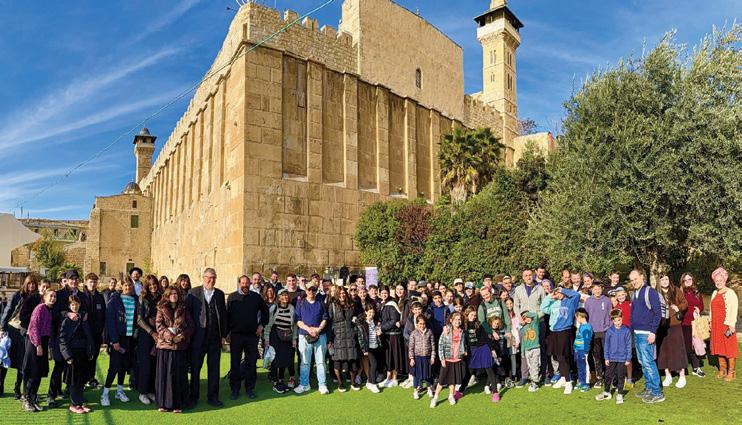






Yael asks:
One of the singles I represent opened up about something delicate. She’s in a relationship where the emotional pace feels mismatched.
“How can I handle it when the pace of the relationship feels different for each of us? I don’t want to feel hurt, but I also want to keep things flowing naturally.”
Aleeza answers:
Thank you for asking such an honest and important question. So many people experience this one person moves a little faster, the other a little slower and it can create real emotional tension. I want you to know, you’re not doing anything wrong. You’re just human. And so is the person across from you. What I’ve learned over the years is that relationships don’t always move in a straight line. One person might be clearer,
SHABBAT AFTERNOON PARSHAT HASHAVUA SHIUR
Given this week by Yitzchak Friedland Beit Knesset Ohel Yitzchak, Rechov Washington 12 at 5:30pm
quicker, more certain. The other might need more time, more space, or more questions answered before moving forward. That difference doesn’t mean the connection isn’t real. It just means you’re two people with two different emotional clocks.
This is how Hashem created the world: not with perfect symmetry, but with contrast and balance. Think of it like a dance sometimes one leads, sometimes the other. The key is not to match every step perfectly, but to stay in rhythm together.
If she’s the one who feels ready sooner, it can be painful to wait. And if she’s the one who needs more time, it can feel overwhelming to keep up. But here’s what I want her to hold onto: if there is kindness, honesty, and effort from both sides, the pace can adjust. The gap can close.
Here are a few questions she can reflect on:
• Can I share my feelings gently without pressure or judgment?
• Is the other person emotionally present and responsive, even if slower?
• Can I be patient and trust the process without abandoning my own needs?
Each has their own pace, and their own path of growth. If this relationship is meant to last, it will find its way to align through their conversations and connections.
So she should keep breathing. Keep




Founded in Israel in 2019 and led by Rav Rimon, Shagririm Balev - a social online matchmaking initiative - has taken the dating scene by storm. With over 10,000 candidates and 3,000 Ambassadors, in Israel and the US, Shagririm Balev is averaging a Wedding every 2 days!



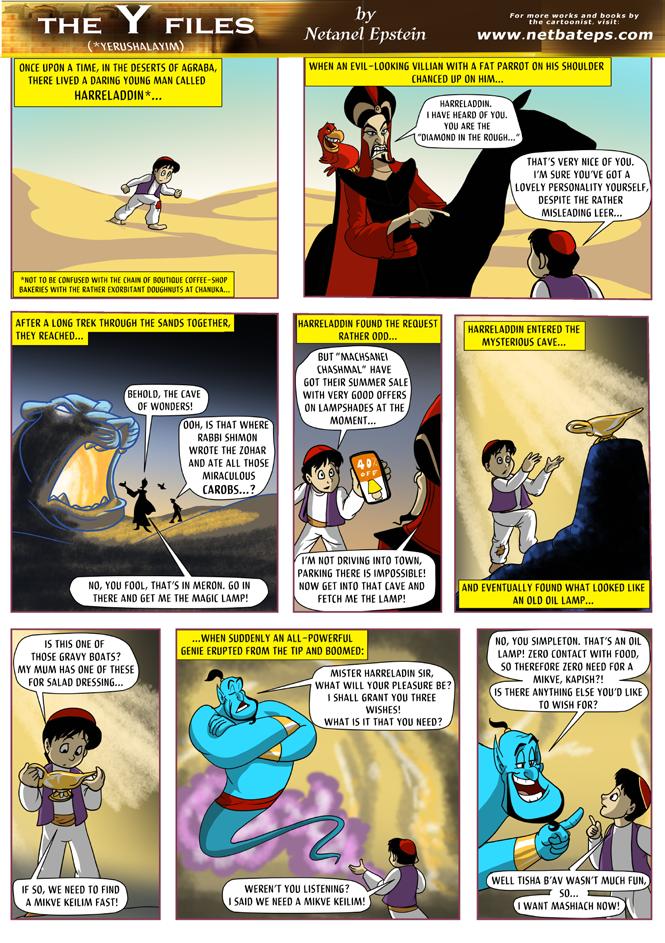
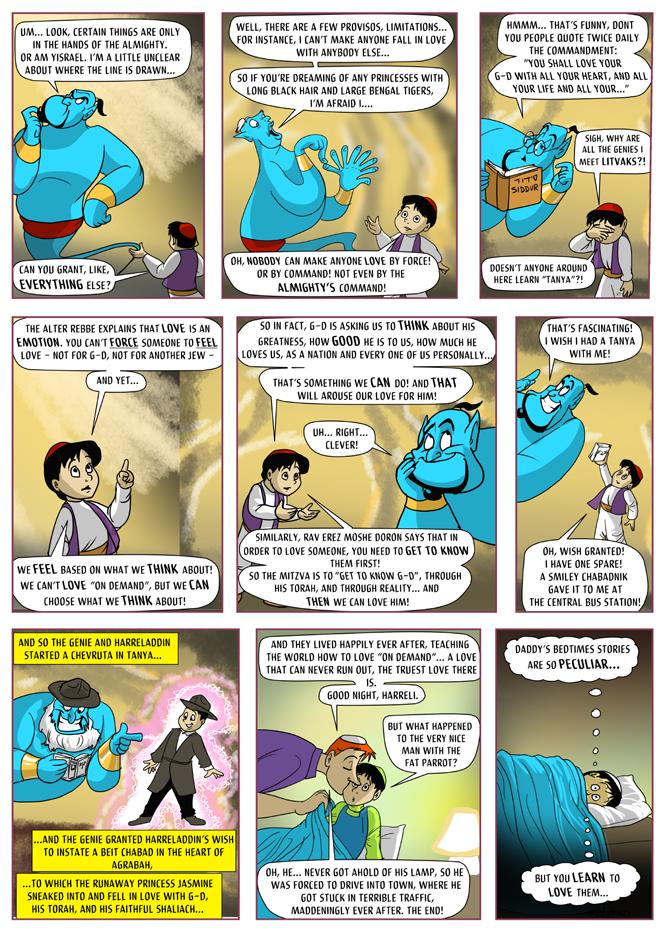


Shabbat Nachamu marks the beginning of the אתמחנד העבש, the seven Shabbatot following Tisha B’Av, during which we read from the later chapters of Yeshayahu, offering messages of hope and comfort after mourning the tragedies of Tisha B’Av.
Yet in this week’s parsha, the Midrash describes a heartbreaking scene: Moshe pleads with Hashem to allow him to enter Eretz Yisrael . He offers 515 tefillot , but Hashem tells him to stop praying about the matter.
This is the week we are meant to begin feeling comforted after all the destruction and loss—so why do we read about Moshe being denied entry into the Land of Israel? How is that comforting?
From Moshe’s story, we learn an important lesson about what true nechama is: the ability to continue after tragedy. Even after

his lifelong dream is denied—and as devastated as he must have been—Moshe doesn’t disappear. Instead, he continues to lead. He strengthens the Jewish people under new leadership and gives them the guidance they need to enter the land.
That was Moshe’s nechama: seeing the future and success of his people, even if he couldn’t reap the benefits himself. That is also our comfort after Tisha B’Av—that the story is not over.
After the Holocaust, this was the mission of so many brave survivors. That was their nechama: the families they rebuilt, the Torah and Jewish institutions they established. No nechama was greater than the creation of the State of Israel—the greatest symbol of Jewish continuity and survival. A Jewish country protecting and uplifting one another. A Jewish army saving other Jews.
That is true comfort: despite the tragedy, there will always be a Jewish future.

In our parasha, we encounter one of the most famous verses in the Torah—perhaps the most famous of all:
There are several ways to understand this verse, but perhaps the most common is as a
prayer to Hashem—a plea asking Him to listen to Am Yisrael and to our prayers, because He is our God, and He is One.
But if we look at it from a different perspective, the whole meaning shifts. Instead of being directed toward Hashem, it becomes a message to Am Yisrael, and a powerful one at that: “.דחא ’ה ,וניקולא ’ה —
Listen, Israel—Hashem is our God. He knows us and what’s best for us. He is the only One who knows us so well.
Even when certain mitzvot or halachot feel difficult or don’t make sense to us, we can remind ourselves of Shema Yisrael, and remember: this is what Hashem wants from us, and if He told us to do it, then we are capable of doing it.
Shabbat Shalom

Brand new building in Mekor Chaim
Recently finished, 4 rooms, 111m, mirpeset, storage, parking, Shabbat elevator, 3rd floor. 4.37m shekel
Great opportunity to buy in a new building under construction in Arnona/ Talpiot 2-5 rooms, great prices starting at 2.37m shekel
For Rent on Pierre Koening
Close to Nitzanim and Emek Refaim, 4 rooms, 1.5 bathrooms, 90m, 2 floors up, appliances and most furniture, parking lot, 8500nis/month from Sep 1st
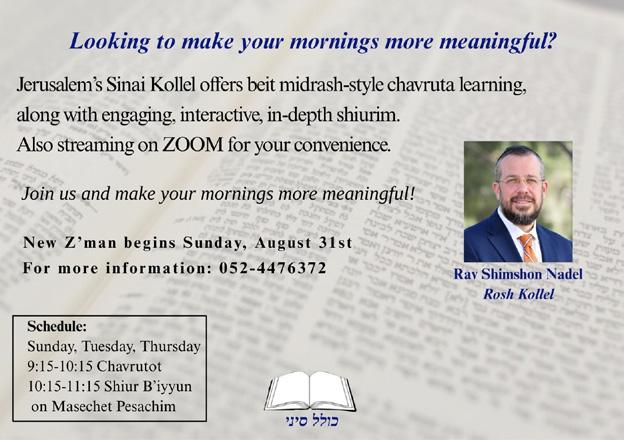



For Sale in Jerusalem
B- Ramot –
8 room cottage, 4.990.000 NIS
For Sale in Efrat
Zayit: * 4 room apt. Stunning view. Elevator. 2,590,000 NIS
Zayit: * 3 room apt. next to the mall. 1,990,000 NIS
Tamar:*4 room apt.105m 2.95 NIS
Te'ena: * 6 room Cottage, 215m. Stunning view 4,850,000 NIS
Dekel: 5 room apt. 150m. +50 m. floor. rd balcony with pergola, 3
2.750.000 NIS
: For Sale in Elazar
* Renovated 6 room apt. 170m on one floor. 2,690,000 NIS
Gabi- 0524588716






